#So similar both in stories‚ influences‚ relations and personality in some ways. So similar in movements in the end
Explore tagged Tumblr posts
Text
It's as if they're saying... "Why... why did you and Imbibitor Lunae commit such an unforgivable sin?"
I know that you have no interest in my answer.
...which is why I asked the question as you looked me straight in the eye. I've asked myself that same question infinite times... but was never able to find the answer...
Why... why is it that only the abominations can return time and time again...?
Why does someone like her have to be buried, burned to ash, and eventually forgotten...? Why!?
This play on questions that await no answer, yet are in their way a response to what was asked, is so good
#The way they manauver around silences and how they don't say straight away what they mean and meant and felt and thought#yet know and understand even in their not sharing the other's position#I love how it works with Jin.gliu's understanding of Blade seeking B.ailu but not taking her medication‚#hoping for a different kind of treatment‚ just as she had#They stood in opposite sides of a board‚ with totally contrary opinions on the same matter‚ yet ended on the other side of each other#So similar both in stories‚ influences‚ relations and personality in some ways. So similar in movements in the end#So similar in drive to live beyond their death at the end of it all. Unable to let go and move on#Holding on to grudges and hatred and their sword if only to keep the pain and the memory alive if it's all that rests#I love them so much#I talk too much#Traces#Fragments and scraps#Why did you do it? Why is it that only monstrosities come back? Why did you do it? Why does she stay dead while my flesh restores itself?#Why did you do it? But seeing Bail.u is the best medicine she could have hoped for. And he did it‚ but is full of regrets#The absolute reproach and yet the mutual understanding is so good. It feels so natural and coherent. So human#I truly love them and their dynamic a lot#Also‚ obsessed with the fact that Blade says she stabbed him through his heart in the final blow‚ and how the image reflects it#'In the end‚ you stabbed me through the heart and left me and the sword in that withered grave'#'最后‚ 你刺出穿心一击‚ 把我和剑一起留在了那片枯冢'#I can't tell just how moved this whole quest makes me and how satisfactory it was to me haha#The Gongshu reference makes me want to scream every time#The weight of 'you left me and the sword' with how Blade and that sword are linked in life and death and change of being and name#Avfkabfkkd I couldn't love him more
0 notes
Text
Felassan - Inquisition Companion + Romance Option
I blacked out after work and wrote this in a daze. Enjoy?
Felassan presents himself as a Dalish dreamer mage and friend of Solas, joining up with Solas from the very beginning after the Conclave.
He is romanceable by any gender or race, unlike Solas who is still race-locked (but bisexual — because the main gripe between the two is the topic of modern elves and anyone else being “real”). I think it would be interesting to also have specific dialogue if you try to romance both at once — Felassan would urge Lavellan to be careful with Solas either way, though it turns more clearly yearning and sad if the player has also triggered the beginnings of his romance.
Since Felassan’s addition to the group would be an extra mage, I think to balance all that out Cullen should be able to be taken at least on some outings, and we could have an extra rogue as well (Harding would fit here, I think).
more under the cut
Personality
As a friend of Solas and his direct counter, it’s immediately noticeable that Felassan is much more friendly and playful. Notably, he enjoys chatting up a Dalish inquisitor about being Dalish, and answers questions companions have about the elves with far more enthusiasm than Solas. If the two are in the party together, he will actively tell people not to listen to Solas and poke fun at him for being rude.
He gets along well with all of the other companions. Some who get along less well with Solas will comment on how they don’t know how he’s still friends with him when they are not in the party together. He gets along especially well with Sera, showing interest in her upbringing without making her feel condescended to the way Solas does. He particularly enjoys hearing about the Red Jennies and her efforts at helping to even the playing field for the underprivileged.
He gets along with Vivienne as well — I think it would be interesting for Vivienne to be vaguely familiar with him after he had been friends with Briala. I think it’s not a terrible idea for him to have still been involved there, too, as it could come in handy during Wicked Eyes and Wicked Hearts.
Story Influence
The main differences with Felassan’s presence would likely come into play mostly with things to do with the elves.
Wicked Eyes and Wicked Hearts
Felassan is one of the most useful companions in this quest. Knowing Briala personally makes it easier for the Inquisitor to convince Briala to either:
Get back together with Celene
Become the puppet behind Gaspard
Felassan knows his way partially around the palace and is able to direct the party slightly when looking for things needed to advance the quest. He is also friends with some of the servants, allowing them access to some of the servants’ tunnels in a pinch.
He makes cheeky, sarcastic comments about the nobility when asked. He’s better at not speaking about his past, so he doesn’t get shifty during the quest like Solas does. He’s happy to dance with the Inquisitor, enjoying the scandal it will cause, with maybe a special line with a Dalish Inquisitor. Rather than single them out and make them “special” compared to other Inquisitors, it’s mostly just on principle of relating to them as another elf, similar to dialogue that can be triggered with Bull about being Qunari (or Tal-Vashoth, in that case).
What Pride Had Wrought
Welcome Felassan as the 3rd option for the Well of Sorrows!
This is where he becomes a real player on the table. He will argue with Morrigan about the Dalish, correcting her outright in places. They never gave the Dalish Inquisitor a real chance to argue with her about things, or explain things themselves, so he has snarky commentary either correcting her or being surprised when she gets things somewhat right. There are also scenes where he will take up the explanation entirely.
Felassan being present also will give the player the correct answer to the rituals. He knows them, explains offhandedly that he’s been here before as an excuse, and makes it far easier for the player to ally with the Sentinels rather than fight them.
By the time they reach the Well, things are tense.
Solas still fights with Morrigan and the Inquisitor both. If the Inquisitor brought him and Felassan both, he will immediately reject the idea when Felassan offers himself as an option.
Romanced!Felassan wants to do this for you — he knows what will happen, he knows the weight of this decision, and he doesn’t want this for you. He will elaborate if asked that drinking from this well will bind you, not only to the memories within, but the will of Mythal. The Inquisitor can, at this point, shrug this off if they don’t believe in Mythal or that she is still alive to control them. If the Inquisitor still chooses to drink themself, he accepts this, but tells them that he will help them with any… side effects, should they arise.
Unromanced + High Approval!Felassan will say something similar — you are his friend and he wishes to keep you safe. He will elaborate similarly if asked with high approval.
Low Approval!Felassan offers himself as a Dalish authority, perhaps derisively suggesting that he is older and wiser than a Dalish inquisitor, and that this is his responsibility, not theirs.
Either way, Solas is NOT happy, but will ultimately accept the final decision.
Trespasser
We come upon the eve of the Betrayal of Felassan.
At low approval, Felassan will have left some time in between the end of the main story and Trespasser, seeking to follow in Solas’s footsteps and find him. Despite not having high approval, Felassan is still fundamentally opposed to Solas’s decision, and will be trying to track him down alone to stop him — something Solas has been running to avoid at every turn. He does not want to see Felassan — he does not want to kill his best friend.
High approval and/or romanced Felassan is present and there to help the whole way through.
Romanced Felassan particularly will have a scene where he will quietly pull his love aside and ask if they trust him. If they say yes (or “You’re scaring me.”), he will tell them that this will sound crazy, but ask them to listen until the end before saying anything else. He will explain the story of the Dread Wolf as he knows it — the rebellion, the Evanuris, the vallaslin, all of it — and then, at the end, explain that he knows this because he lived it. He tells the story of the slow arrow and the Dread Wolf (a Dalish inquisitor can recognize it midway and will interrupt with surprise) and explains that he was there. That he has known Solas for thousands of years, that he has walked this land for thousands of years.
He will also explain that he knows what Solas wants and that he must stop him — that they must stop him. Solas wants to fix what he thinks he broke, but the people alive today do not deserve the fate he would have of them.
And Felassan is willing to do whatever it takes to stop him.
High approval Felassan will explain in much less detail via commentary while discovering the murals in the Crossroads, leading up to eventually finding Solas.
Once Solas has been found, Felassan runs ahead of the group, disregarding calls for him to stop. The Inquisitor is left one man down as they chase after him until, finally, they reach the place where Solas waits — and they find Felassan in Solas’s arms, a knife through his ribs.
Felassan will be stabbed by Solas regardless of Felassan’s approval with the Inquisitor. However, depending on choices made during either Solas or Felassans personal quests, and maybe Solas’s level of approval with the Inquisitor, Felassan can die.
The Inquisitor who loves him or is his friend will rush forward as Solas stumbles back, catching Felassan and holding their hand over the wound, careful not to move the dagger. Between the blood and the Inquisitor’s mark consuming their other arm, they are a sad sight.
Solas apologizes, but states that it was necessary. He would only get in the way. The questioning continues as normal here, up to Solas taking the Anchor.
Romance
I’m not entirely sure how this would go yet. I think he’s playful and flirtatious if the Inquisitor starts it. He will throw out Dalish phrases sometimes “for privacy,” with a Dalish inquisitor, which comes with a very obvious, if not always visible, wink.
His quests do focus around his identity as an elf, and around preserving elven history, whether the Inquisitor is Dalish or not. While this kind of happens with Solas, a lot of his dialogue is about how wrong the Dalish are — Felassan provides a different, more loving perspective on the modern elves compared to the ancients.
I think a love triangle route between him and Solas would be SO juicy. He wants his friend to be happy, but he knows that Solas does not believe that the elves are full people, and is concerned for the Inquisitor because of this. I think even if the Inquisitor locks in Solas, if the flirts were triggered with Felassan, you CAN actually come back to his romance after Solas dumps you (which, especially if they let him remove the tattoos, can hurt both you and him). I think it unlocking a special scene where he says that yes, he knew what they were and yes, he chose to keep his because he wanted them, would be sweet (and relatable if you chose to kEEP the vallaslin).
Overall, I think his romance would be sweet and fun. A direct counter to Solas and Sera, two elves who hate other elves. Felassan is proud of being an elf, he is proud of the resiliency of both the Dalish and city elves. He’s interested in every part of the world, including the dwarves, Qunari, and humans.
It's been a very long time since I played DAI so please forgive any inconsistencies. I just needed to write something down after work lol. tagging people who showed interest earlier! @lammstrellicon @swoleas @isayashai @witchofthewakingsea @ash-soka
83 notes
·
View notes
Text
Offtopic Offseason #2 - The Incoherent Musings of a Star Wars Fan in Big 2024.
So, being a Star Wars fan is hard.
I don't mean that for some stupid "STAR WERZ IS WOKE NOW! CHILDHOOD RUINED!" bullshit, I mean being an actual fan of Star Wars.
I want to watch Star Wars shows, I want to play Star Wars games, and I deeply disagree with the idea that Disney is making too much Star Wars stuff. No, in fact, my stance here is quite similar to my stance on superhero fatigue from the last Offtopic Offseason - and that's that people aren't sick of Star Wars, they're sick of bad Star Wars content.
Let me put it this way - the only buzz I've heard about Skeleton Crew is that they referenced something from the Holiday Special and that there's a kid from that Max Rebo species - the Ortolans, the blue elephant guys. That doesn't fill me with an urge to watch it.
Just like I haven't had the urge to finish The Bad Batch.
Just like how I haven't picked up Star Wars: Outlaws yet.
There is, however, one Star Wars project that I did engage with in 2024: the Acolyte. Yup, the show that the internet was shitting on before it even came out and the one that they managed to get cancelled despite the first season ending on a blatant cliffhanger. I want to talk about that show.
Why? Because the thing is...I don't think the show is that bad.
I certainly don't think it's any worse than Book of Boba Fett or some of the later episode of the Mandalorian.
In fact, I'd say the concept of the Acolyte is more interesting than either Mando or Boba Fett, and here's why: the idea of a woman, who had the only home she ever knew taken away from her by the Jedi, training under a Sith to get revenge is an interesting premise.
That same Sith disguising himself as her bumbling accomplice to monitor and influence her had potential as well.
The Jedi Order being this corrupt, detached organization trying to maneuver the political intrigues of Coruscant is interesting, as is the fact that the plot is ultimately set into motion by Master Sol making a series of impulsive and violent decisions - thinking they he knew better - that ended in him killing the girls' mother, Aniseya.
All of that I'm good with.
There are a few things I'm not so good with. The vergence stuff and how that relates to the twins (and them being two sides of the same person) didn't quite work with me. I also felt that some of the stuff they did with Aniseya in the final two episodes undercuts the Sol storyline, because one: she really does demonstrate she's dangerous, and two: if you're still planning on letting Osha go with them, why are you using a Dark Side ritual to turn yourself into an dark smoke monster and absorbing your other daughter while doing so?
Like if the point you're going for is that Sol broke the Jedi teachings because of his selfish attachment to Osha - later leading to Osha killing him as her fall to the Dark Side - then why are you giving him a justifiable reason for stopping Aniseya?
And I guess on some level, I question how much purpose there was to having both Osha and Mae as characters. I know this is probably approaching a sort of Ship of Theseus point where I change so much about the Acolyte that it's not the Acolyte anymore, but I feel like there was a way to tell this story with just one character rather than this split person/twin thing.
You know what, I'll commit to it - here's how I would've done the Acolyte show.
Indara, Sol, Kelnacca, and Torbin go to investigate Brendok, just like they do in the show, however, when they find the convent of Dark Side witches, they decide they need to stop them. So rather than a series of potentially sympathetic misunderstandings, it's that the Jedi saw a Dark Side threat, they got spooked, and they decided to crush it.
This is to mirror some of the other darker Jedi moments in Star Wars, such as Mace Windu saying that the "oppression of the Sith will never return" before attempting to finish off Palpatine, or the Legends lore of the Jedi bombardment of Korriban after the Great Hyperspace War, aiming to destroy it.
Neither of these things worked, sure, but it demonstrates a rare Jedi ruthlessness that could suit this story nicely.
Anyway, having lost the only family she had, Osha (who, remember, we're treating as a single person at this point) wanders the galaxy and eventually winds up at the ruined Sith Academy on Korriban - and here she finds Qimir.
Qimir plays it cool and doesn't quite reveal who he is but starts telling Osha about the Sith and feeling her out, trying to figure out if she'd make a worthy pupil or not. Qimir sends Osha through the tombs like in KOTOR or like the Sith Warrior/Inquisitor storylines in SWTOR and starts revealing more about the Sith to her as she goes on. By the end, she believes in it, is willing to become a Sith, and makes a red lightsaber.
Then Qimir sends her out to hunt down the Brendok Jedi. At this point you could probably split the show into a season one and two, where the first season, "The Acolyte" is the story of Osha being an acolyte on Korriban, and the season two would be like "The Apprentice" or something a bit less trademarked, probably, and be about Osha actually hunting down the Jedi.
And hey, maybe it's a shitty idea, but I think it would place the show better in the lore and give us an interesting perspective where we follow a Sith character who fully believes she's in the right, and because of how this version of the Brendok events played out, we can't really say she's wrong either.
Maybe all of that is a product of the kind of Star Wars fan I grew up as though. I was born in the prequel era, meaning that for me, Phantom menace, Attack of the Clones, and Revenge of the Sith were always part of Star Wars. I grew up playing KOTOR on my dad's computer and then later watching Clone Wars and then after that getting really into SWTOR for awhile in the early-to-mid 2010s.
Star Wars to me is lightsabers and deep lore and the Jedi versus the Sith.
I guess that's why Acolyte, for all its flaws and mistakes and strange writing choices, got my attention in a way that a lot of Star Wars stories haven't.
I mean, I watched Acolyte all the way through while I still haven't felt motivated enough to watch Andor - I'm sure that for a lot of nerds, that's downright sacrilege - but that's where I'm at with this franchise.
Do you have any idea how long it's gonna take for someone to be willing to make a female-led Sith show after how the Acolyte bombed? I'll be waiting decades at this rate. I'll be waiting even longer when I ask for those characters to one: be aliens because goddamn all these species in the galaxy but the only ones that ever seem to do anything are humans, and two: be lesbian because...I dunno man, representation makes me feel good.
I guess Mother Koril checks a lot of those boxes but...she's got like fifteen minutes of screentime max and then kinda turns into a cloud of smoke and we don't see her anymore. Is she dead? Is she alive? Is she some other third thing?
Nobody knows.
And we're probably never gonna know because the show's been cancelled.
Fun times.
So yeah, these are some incoherent musings from a long-suffering Star Wars fan in 2024.
Like the meme says...
Star Wars would be so good if it was good.
39 notes
·
View notes
Text
So I've read the opening story of Tim Drake: Robin.
The opening issue is solid, highlighting a lot of Meghan Fitzmartin's skills as a writer. She picked up threads neatly from her earlier stories, showed her hand to the audience, and did do a fair amount of subtle character work. If I'd picked it up with no background knowledge of the fandom conversation about the title, I'd have been very excited for where it was going.
I liked the links back to how part of what prompted Tim to move out was Bruce being fussy over Tim having been shot in the throat in Batman #125. That felt realistic and a nice little link between titles.
As far as a story goes: I didn't mind it. Parts of it were very obvious, especially when you clued into the themes - if I'd actually been reading it as it came out and had a month between issues for things to soak in, I probably would have been tapping my toes over the reveal of who Moriarty was disguised as.
I would like to specifically dunk on both Meghan Fitzmartin and Moriarty for the detective novel writer selections, because...hmm. Kinda misogynistic there. Fitzmartin uses 6 writers for this, and 6 specific stories/franchises:-
Edgar Allen Poe – Murders in the Rue Morgue
Mark Twain – The Stolen White Elephant
Arthur Conan Doyle – Sherlock Holmes
Raymond Chandler - Goldfish
James Gelsey – Scooby Doo
Wilkie Collins – The Moonstone
What do you notice about this list, that I immediately noticed? They're all men. Who is an immediate name that comes to mind, who even had public domain stories as of 2022, who probably should be on a list like that and who also has incredible influence over the direction of the genre? Oh, I don't know, maybe Agatha Christie? (Also Dorothy L. Sayers is also right there and available, but skipping Christie?)
And once she'd built up this "it's all the detective stories" premise, Fitzmartin then went for a book code (cool!) from non-existent books (not cool). If you've just spent all this time glorying in how this is all related to Specific Classic Detective Stories, why not...use a real book code and refer to their actual stories? You've already done it for the plots! Commit to the bit!
Also I spent a good chunk of issue #4 staring at the page going "Carol Donovan? You mean Deb Donovan's judge daughter who recently appeared in Mariko Tamaki's 'Tec run? Tim, how are you missing something this straightforward? Also she's dead?" and then it never came to anything. Maybe do a quick check if anyone else has been using the name you just invented for the story.
"I even tried making a new costume for myself. It doesn't fit." - I did find it interesting that Fitzmartin was once again playing with the "is it time to move on" themes for Tim that were popping up around here in various conversations. Especially given she had Tim and Dick relitigate their conversation from Urban Legends #10 and similar themes in DC:YJ. It does suggest to me that she was working her way around to getting Tim into a new identity, but cancellation has once again left that in the 'not happening' basket.
In terms of the art: Riley Rossmo was the wrong pick for the title, but I do see the thought process that led into him getting the nod for the opening story, given the whole claymation villain set. It was very 2D animation style. I don't mind Rossmo (and interestingly he's developing a whole line up of detective stories he's done art for, given he's also had a Martian Manhunter book and got Wesley Dodds, he did one of the Batman/The Shadow crossovers...) but his highly malleable art style loses a lot of background detail or makes what is there harder to parse.
I did very much appreciate the way Rossmo drew Tim's detective work, though. I liked the technique for highlighting details and clues, and it actually very much reminded me of how some computer games present clues (including how it's done in Gotham Knights, in fact).
I know everyone has said this, but Bernard needs to develop a personality AND to commit to whether or not he knows Tim is Robin. Because sort of hinting that he knows, while Tim worries about hiding things from him, but not actually confirming either way is only really acceptable if you actually do build up to a big reveal moment where the whole drama has been paid off.
I did appreciate that MegFitz had clearly taken feedback and returned one of Bernard's two pre-existing personality traits (conspiracy theorist who thinks the Bats are urban legend cryptids), because one of the weaknesses of using Bernard, a side character with 6 preboot appearances, is that at lot of his existing personality was sketched in. He was a conspiracy theorist, and he desperately wanted to be popular but wasn't, so he presented himself as having a Cool Guy's Personality (see: 'your step-mom is hot'). Now, Meghan Fitzmartin wants us to read into that second trait as a facade that Bernard was putting up to deal with the fact he was gay and hiding it, probably even from himself, at the time. Which, fine, it's a perfectly reasonable reading of Bernard (and to her credit, MegFitz has Bernard spell it out a little on page in TD:R), but the problem is...you've just lost one of the two identifiable traits of 'Bernard' and it hasn't been replaced with anything else. And while 2004 in comics was still trying to hold onto the Urban Legends reading for the Bats to an extent (though it was failing), 2022 comics has so long since abandoned it that Bernard having kooky theories about Batman's connection to Mothman or whatever is very...why?
And because both of these pre-existing personality traits are under strain from the context, it really is sort of necessary to give Bernard something else about him for people to latch onto for his personality. And it doesn't really seem to be there yet (as of #6). It's the same complaint that people have about Jon/Jay and a whole host of other partners for recently out superheros: they're generically pleasant, supportive and bland, with about the depth of a mirror. Give me some of the toxic drama the 30 year old lesbians are allowed. Where is my breakup over custody fights with an ex and one of the two getting seduced by a vampire.
44 notes
·
View notes
Text
Hey does anyone wanna hear my thoughts about how Madarame and Fujieda's routes are essentially the same thing but in a different font????? Huge spoilers for the true route of Slow Damage.
Once I started playing Fujieda's route it struck me how it pretty much followed the same story beats as Madarame's:
Towa is confronted with a relic from his past > Something about it nags at him so he starts poking around > He remembers something from his past > He comes to terms with some aspect of his identity > Confrontation with the Takasato asshole that's been causing issues
But aside from that, both Madarame and Fujieda reflect different aspects of Towa's character. Both of their routes revolve around the idea of meeting someone so similar to you that they might as well be a mirror and the understanding that's born from that. The main difference is what they reflect and the traits they bring out in each other.
Madarame essentially reflects all of the things that Maya made Towa into. When they're together, they reflect and amplify the rougher edges of each of their personalities. Towa's apathy, his recklessness, his impulsivity, and his masochism are the things Madarame considers to be Towa's "true self". They're the parts of Towa that he sees reflected in himself; the parts of them that operate on instinct rather than the norms of society. Madarame loves Towa in his own way, and accepts the "roughest" version of himself, but these aspects of his character are things that Towa became because of Maya's abuse. It ultimately works for them and they find their version of happiness, but the more instinctual Towa that Madarame sought out is a version of Towa who is ruled by his coping mechanisms and survival instincts. To find this happiness (a happiness found in pain and danger), Towa must first be broken and regress back into his trauma. Madarame and Towa reflect each other in a way that enables the worst of their behavior.
Fujieda, on the other hand, reflects everything that Towa is DESPITE Maya's influence. (There is still that aspect of mirroring each other through their trauma and their shared scars is one of the big reasons they begin to connect, but it's more than that.) They reflect each other in their resilience in the way they choose to keep living and their refusal to let their trauma further define them. Both Towa and Fujieda suffer from survivor's guilt and consider suicide, and yet both of them make the difficult choice to keep living to some degree because of the other's influence. They reflect each other in the memory of the girl who gives them both the strength to carry on; someone they loved and lost. They reflect the ugliest and truest parts of themselves, showcased in their negative first interactions early in the game and the literal/metaphorical scars they share. Yet, despite how scared they both are at being confronted with someone so similar, they see the beauty and humanity in each other where they struggle to see it in themselves. Because Fujieda's character mirrors Towa's so closely, he's able to relate deeply to Towa and understand how much of his behavior is an attempt to regain his autonomy and recognizes that he could have very easily ended up the same way. Fujieda loves Towa for who he's managed to become despite Maya's abuse, and it's this mutual understanding that allows them to support each other so thoroughly. Fujieda and Towa reflect each other in a way that ultimately supports a journey to healing and recovery.
Anyway, if you actually read all of that I would love to hear your thoughts because it's been rattling around in my brain for too long!
#i would like to clarify that this is NOT madatowa hate.... i think they're fascinating and i have a deep respect for toxic yaoi#slow damage#towa slow damage#madarame kei#fujieda ryo#surodame#nitro+chiral#analysis?? sorta??#really just me rambling but oh well#edited to better flesh out a few thoughts. also wanted to make it more clear that despite my fascination with the madatowa dynamic#i think towa deserves better and that ultimately if madarame got hit by a bus it would probably be for the best <3#is this conflicting with my earlier statement that this is not mdtw hate? Yes and No. i dont hate mdtw! but i do. but i rlly dont. but i do#idk someone ask me about it i have a lot of conflicting thoughts and emotions
71 notes
·
View notes
Note
Hiya!! I’ve got a couple of stories I’m currently working on and because I also draw a lot, I like making illustrations for the stories. One of my protagonists experiences psychosis, and occasionally suffers with hallucinations. When drawing hallucinations (or expressing other elements of psychosis), is there anything major to avoid doing? For reference, the main reference for how I was going to draw them was similar to how the show Arcane expresses psychosis, since I like the artistic direcrion of the show overall, and I’ve been only positive feedback on how Jinx’s mental health was portrayed.
Hey!
I think it depends on what kind of hallucinations she has. I personally liked the way Arcane did it, and I think it works both for Jinx as a character and the show in the aesthetic sense.
However, I think it could be cool to visually show that for a lot of people, hallucinations aren't “obvious”. They can be incredibly regular things or just be “kinda weird/out of place” rather than clearly impossible to onlookers (in this case, readers)
Someone could also have both - they could hallucinate a person who definitely isn't there (like Jinx seeing [characters who have died]) but also have some that are just... hard to differentiate as an actual hallucination (like seeing a regular dog being outside, appliances being on, sounds that make sense but aren't there, etc.). Arguably, if she has both, the second ones become much harder to spot in comparison.
Another thing is what kind of things she's hallucinating. For Jinx, they were distressing and related to traumatic events, so the whole experience is obviously intense and full of PTSD flashbacks. This makes sense for her as a character. I really liked the tense slow-motion that was used in some earlier scenes of her as a child and the exact opposite used for her older self with the quick cuts and incredibly rapid pace, because it really can be like either of these.
But then again: some people see things so boring that there's no emotional reaction. Sometimes people don't realize they're hallucinating because the hallucination in question is a stranger sitting on a bench you're walking next to in a perfectly normal fashion, or something else that you wouldn't pay attention to, hallucination or not. I know of people who look through their phone/camera lens at things they think might be hallucinations because they don't show up on photos, and they just want to make sure (I've done this with audio recordings before). Would someone like this experience psychosis the same way as Jinx, who is shown surrounded by neon sketches of beasts with giant sharp-teethed mouths barking at her? Possibly. But there's a big chance it's simply not as intense in the visual sense (it can still be incredibly stressful on the inside).
So to kinda answer the question, it depends on the above. What is her relationship with her hallucinations? Some people like theirs, hallucinations can be positive or neutral, even comforting. Is she used to them? Does she know that she's hallucinating? Why is she hallucinating exactly (flashback? stress? under the influence? no reason? fatigued?)? Does she have “regulars”? They don't have to be literally people that show up regularly, but things or just general themes that can be related to the person's life. You might have one set of hallucinations that appear as a result of X, and a different that shows up when Z happens (with Jinx, she hallucinates [dead characters] very realistically when general PTSD flashbacks happen, but much more abstractly when confronted in a stressful, overwhelming situation where she's panicking). Is she only hallucinating impossible things, regular events, something in-between, or all of the above? (As someone in the last category, I'd love to see that.) Are there sounds, tactile feeling, smell, taste? (I guess hard to convey visually on a drawing, but still something I'd love to see, delusional parasitosis is such a classic it has its own name).
It might make perfect sense for your character to experience her hallucinations in the same visual manner as Jinx, but they might also just look like another slice-of-life panel with nothing out of the ordinary, they may be just slightly “off” with the hallucinations sticking out like interactive objects in video games, or maybe the entire hallucination is just the sound of neighbors arguing upstairs. Which again: the latter options can be hard to do visually, but if you establish that place X looks like that and definitely doesn't have that object in there, and house Z definitely doesn't have a second floor, you can clue readers in a more subtle way that I think could also show that sometimes psychosis is easy to miss.
Psychosis is diverse, and I don't feel like I can't say that there are contents of it that “shouldn't be shown”. People absolutely hallucinate demons, ghosts, blood, or other “stereotypical” things; there is a kernel of truth in the “evil hallucinations” trope (though that's where the truth ends to be honest). For every person who tells you to not draw shadowy figures as an example of a hallucination, you will have two people who will tell you that it happened to them last week.
The thing I'd urge you to not do is much less concerned with actual hallucinations, and more with their context in their story and how they are portrayed.
The point is to not demonize it in narrative, and understand that the character isn't their hallucinations - they're not “subconscious desires” or proof of anything, they're not a sign of something supernatural happening, and they're not any kind of indicator of the person's morality or potentially being dangerous. And, I can't stress this enough, they aren't “predicting the future”. Don't use the psychosis as a Chehov's gun or other implication that the delusions are real for the sake of your psychotic readers.
Sorry for the non-answer answer, but I hope it helps.
mod Sasza
51 notes
·
View notes
Note
Do you ever think about the fact that like, we know NOTHING about buggy? Yes of course we all know the devil fruit thing and how he was on Rogers crew, but the sheer amount we DONT know? Insane.
1 How the frick did he get on rogers crew?? Did roger kidnap the poor the kid? Did buggy just stowaway or something? Roger wouldnt take on anybody so there has to be a reason.
2 No one else looks like buggy except maybe vivi. Is buggy some long forgotten race? Is he actually royalty but their whole race was wiped out? Is it just a genetic mutation? I NEED ANSWERS ODA
3 WHO ARE HIS FAMILY?! Who are his parents or if he has siblings or cousins??? Did they disown him or did he runaway????
4 This is a personal preference but there is NO WAY buggy is as dumb as he plays. You can’t be that stupid and still be a successful captain/businessman/leader/yonko. Whatchu hiding buggy???
5 Where did the circus act come from? When he was on rogers ship there was no circusy makeup or any mention of things related to the circus, the only thing we have about that is that buggy wore bright clothes, but ROGER wore bright clothes. So did he join a circus after he and shanks broke up?? Is there a backstory there??
6 Last one I promise. Does anyone else think it’s a little strange that there are only two people in the series that wear clown makeup and one of them has nothing to do with the circus? Rosinante and buggy have extremely similar makeup, did they know eachother? Rosinante had no reason to wear clown makeup except maybe as a disguise, what the heck was that about???
7 Okok, last one last one. Did Oda say who he based buggy on? We know that almost every character in one piece is based on someone in real life or a myth. But we don’t know who buggy, an OG of the story, is based on. Little strange don’t you think? Oda?? HMMMM?
Mmm, I agree with you in the fact that we actually lack A LOT of information about Buggy's story (and also Shanks', but that's wayyy more plausible to be told in more detail than Buggy's) and I wish we knew more about where he comes from. But I think I can answer some stuff you mentioned!!!
4. Buggy is not playing dumb in any moment. He is directly not dumb at all and he has been shown countless times being of the most strategic characters in the manga. The one thing that holds him back is not being confident in himself because he still keeps the burden of living under Shanks' shadow on his shoulders so he often acts cowardly and seemingly without any goal at all but to survive. After chapter 1082, though, I think we will see wayyy more of him acting like a boss and following his dream and showing his true abilities. It's not that he's playing dumb, it's that he doesn't let himself be brave and now that he's on the same level as Shanks, he can do whatever he wants (if Mihawk and Crocodile let him lmao). And the reason why so many people follow him despite Buggy constantly saying he doesn't want to be seen this way because he sees himself as a loser who keeps pretending to be great, it's just that he's... Great. He just doesn't see it but he has an inherent effect on people when he gets serious. Being a failguy doesn't make you any less of a genius.
5/6. Actually, I believe we won't really get an answer to that. Perhaps we do if we get another flashback but maybe it's just character design and that's pretty much it. There must be something about wearing clown makeup as a mask of their true personality and yadda yadda yadda but that's for another day.
And about Buggy's past and the theory about him being a Nefertari: It's a pretty good theory and I actually really like it, keeping in mind how much influence both Buggy and Vivi's family are having lately in the manga. But I am not really sure about that being true and I am not even sure either if we we'll get any Buggy flashback at all. So I guess we will just have to wait and see what Oda does!!!
#buggy is one of my favorite characters can you telllll#but idk if we will get a proper flashback idk if i should be more optimistic#i wouldn't be THAT angry if we don't tbh buggy's past is not something i'm that interested in bc i believe he considers roger to be his dad#and that's kind of it. really. like if he doesn't live in the past i don't really care.#shanks on the other hand i would like to know more but that's only bc he's like. extremely crucial for the story#but at the end of the day they go hand in hand right?? so if we get shanks flashback we'll get buggy's#now i am not actually worried at all about this ekfbewkbew#buggy my beloved#buggy the clown#one piece#ask-bean!
52 notes
·
View notes
Text
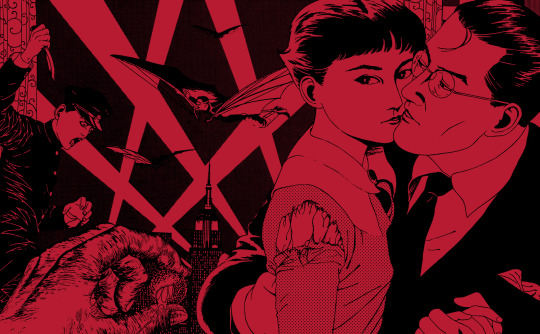
The Post-Futurist Fossils of LITCHI HIKARI CLUB In a somewhat recent research tangent, while considering the possible “genealogy” of the Tokyo Grand Guignol’s themes and aesthetics, I made an interesting personal discovery regarding Litchi Hikari Club. Specifically some distinct thematic parallels that the play shares with the Italian futurist movement, less in relation to the art of the movement itself, but rather the ideologies of the movement’s controversial founder, Filippo Tommaso Marinetti, and his relation to the Italian fascist party. This is all of course in the context of understanding Litchi as a transgressive/dystopian horror story. This is less of an absolute statement than it is a sort of open train of thought, so take things with a fair grain of salt. This is more or less just my own personal analysis of all the materials I could gather of the original play. Beyond inspecting the play as a possible allegory for futurism, there's also just a lot of general analysis of the play in relation to Ameya's overall body of work, both with the Tokyo Grand Guignol and also as a performance artist. I rarely put a 'keep reading' tag on these things since I'm an openly shameless product of the early days of blogging, but this one's a doozy (both in the information but also just the gargantuan length). Hopefully others will find it just as interesting. The full essay is below...
The futurist movement itself was nothing short of an oddity. In their time, the futurists were pioneers of avant-garde modernist aesthetics, with their works ranging from deconstructive paintings to reality-bending sculptures and even early pathways to noise music with the creation of the non-conventional Intonarumori instruments of Luigi Russolo. Russolo’s own futurist-adjacent manifesto, The Art of Noises, would go on to influence such artists as John Cage, Pierre Henry, Einstürzende Neubauten and the openly left-wing industrial collective Test Department. When visiting the MOMA in New York City as a child, I was fascinated by Boccioni’s Unique Forms of Continuity in Space, a sculpture that appeared to be a spacetime malformation of the human figure encapsulated in a continual state of forward motion while in total stillness. Despite this, the futurists were also a social movement of warmongering misogynists, with their own founding manifesto by Marinetti describing the bloodshed and cruelty of war as being “… the only cure for the world”. Their manifesto would also feature quotes such as “We want to demolish museums and libraries, fight morality, feminism and all opportunist and utilitarian cowardice”. They would originally pin anarchism as being their ideological ground in the manifesto, but shortly thereafter Marinetti would pick up an interest in fascism along with the politics of Benito Mussolini, going on to be a coauthor for the Italian fascist manifesto alongside the futurist manifesto. In consideration of how throughout most of World War II, modernist and post-modern works were considered “degenerate” forms of art in contrast with traditionalism, a whole avant-garde movement founded from fascist ideals is paradoxical. But for a period of time, that parallel wasn’t only in existence, but backed by Mussolini himself with there being a brief effort by Marinetti to make futurism the official aesthetic of fascist Italy. One of the draws of futurism for Marinetti was an underlying sense of violence and extremity. According to Marinetti, his initial inspiration for the movement was the sensations he felt in the aftermath of a car accident where he drove into a ditch after nearly running over a band of tricyclists. He conceived his works to be acts of social disruption, intending to put people in states of unrest to cause riots and similar bouts of violence. “Art, in fact, can be nothing but violence, cruelty, and injustice”. He sought to destroy history to pave the way for a rapid acceleration to futuristic technological revelation.

“As shown in Edogawa Rampo’s Boy Detectives Club, young men like to hide from a world of girls and adulthood to form their own secret societies.” - June Vol. 27 In Litchi Hikari Club, a group of middle school-aged boys are faced with a crisis on the brink of puberty. At the twilight of their childhoods, they form a secret society known as the Hikari Club (or Light Club), a collective that’s devoted to the active preservation of their shared youth and virginity. The boys naively mimic an authoritarian organization and its hierarchy as they seek a means to preserve their boyhood, which they see as being idyllic in contrast to adulthood, a dreary state of existence that they call old and tired in the Usamaru Furuya manga version of the story. Similarly, in the Litchi Hikari Club-inspired short manga Moon Age 15: Damnation, the boys go on to liken their hideout with the paradisiacal garden of Eden. In said story, Zera would directly name the poem Paradise Lost in reference to the discovery of their hideout by adults (arriving in the form of ground surveyors) and the wide-eyed daughter of a land broker, with their contact to the virgin industrialized land being an ideological tainting of the sacred lair. In their mission, they seek refuge in technological inhumanity by having their penises replaced with mechanized iron penises, symbolic devices of power and violence that can only procreate with other items of technology. Working in absolute secrecy, they collectively manufacture a robot known as Lychee. The purpose of Lychee, previously only known to Zera, isn’t revealed to the other club members until its completion. It’s when they unveil their “cute” robot in a scene that parallels the 1920 German expressionist film The Cabinet of Dr. Caligari that Zera tells the other members of Lychee’s purpose as a machine that would kidnap women for them. The robot's efforts are assisted by the girl capturing device, a strange rice cooker-shaped mask that’s laced with a sleeping drug. When questioned about the fuel source for the robot, Zera explains how it will run off the clean fuel of lychee fruits rather than an unsavory yet plentiful substance like electricity or gasoline as a means to further match the robot’s perceived beauty.
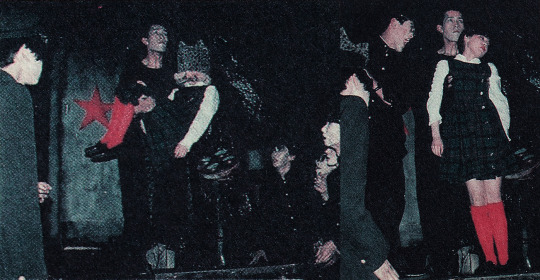
While the club share a general disdain for adulthood, they hold a special hatred to girls and women. Going off the dogmatic repulsion to sexuality that Kyusaku Shimada shows as the teacher in the Tokyo Grand Guignol’s prior play, Mercuro (1984), it could be assumed that the Hikari Club hold a similar dogmatic viewpoint about the vices of sex. In this context, it’s likely that they would’ve perceived women as being parasitic by nature as spreaders of the “old” and “tired” adult human condition through pubescent fixation and procreation. Sexual thoughts are inherent to aging for most people, given the process of discovering and exploring your identity throughout puberty. It’s that exact pubescent experience the club seek to eradicate. Further insight is given to the Hikari Club’s dystopian psyche through their open allusions to nazi ideology. While Zera travels out to gather lychees from a tree he planted, the club get a special visit from a depraved elderly showman known as the Marquis De Maruo, performed by none other than Suehiro Maruo himself in the 1985 Christmas performance. Despite the club’s disposition to adults, they hold an exception for the Marquis for his old-timey showmanship and open pandering to the children’s whims. He always comes with autopsy films to show the young boys, and as they watch the gory videos he hands out candies that he describes as being a personal favorite of the late Adolf Hitler. He was said to also be the one to convince the boys to name their robot after the lychee fruit. It isn’t until Zera returns that the Marquis is removed from the hideout on Zera’s orders. Just before his exiling, he foretells to Zera the prophecy of the black star as both a promise and a warning to the aspiring dictator. It should be noted that there is a fascist occult symbol known as the black sun.

Suehiro Maruo as the Marquis De Maruo. On the right side is a caricature of Maruo as drawn by a contributor to June magazine, excerpted from an editorial cartoon in June Vol. 27 covering Litchi's 1985 Christmas performance. In addition, the Marquis’ role alongside Jaibo’s appearances in the play (which I’ll get to later) show distinct parallels with the presence of the hobo in the Tokyo Grand Guignol’s first play, Mercuro. In Mercuro’s case, the hobo (performed by Norimizu Ameya, who would go on to also act as Jaibo) visits the classroom in secrecy to lecture the students his depraved ideologies. Whilst the hobo in Mercuro was a figure of perversion that existed in contrast to the teacher’s paranoid conservatism, in Litchi both Jaibo and the Marquis are enablers of the club’s fascistic leanings, with the Marquis being a promoter whereas Jaibo is a direct representation of the underlining perversions of fascist violence. Though completely omitted from the Furuya manga, the element of the autopsy films shines a unique light on Zera’s death at the end of the story. In both the play and the manga, Zera is gutted alive by Lychee when the robot undergoes a meltdown after being forced to drown Kanon (Marin in the original play) in a coffin lined with roses. In the manga, Zera appears deeply unsettled when realizing his intestines resemble the internals of an adult. It’s unknown if this aspect is present in the theater version, as the full script remains unreleased to this day. It would fit however knowing not just the club’s repulsion to adulthood, but also how they retreat to technological modification to eradicate the human aspects they associate with adulthood. What is described of Zera’s death in the theater version has its own disquieting qualities as, from what’s mentioned, when confronted with his own mortality he appears to regress to a state of childlike delirium, a demeanor that’s drastically different from his usual calm and orderly presentation. Upon seeing his intestines, one of the responses he is able to muster is “I’m in trouble”. He says this as he questions whether or not he can fit his organs back inside the cavity before eventually telling himself that he’s just tired, that he “need(s) to sleep for a while”.

While never directly stated, it’s heavily implied that the club’s ideologies and technological fetishism ultimately root back to Jaibo, an ambiguously European transfer student who secretly manipulates the club’s actions from behind the scenes. Referred to by Hiroyuki Tsunekawa (Zera’s actor) as the “true dark emperor” of the Hikari Club, he was said to haunt the stage from the sides, closely inspecting the Hikari Club’s activities while keeping a distance. The iron phallus was first introduced by Jaibo through a monologue where he reveals how he fixed one to his own person, carefully describing its inner mechanisms and functionality before demonstrating its inhuman reproductive qualities by using the phallus to have sex with a TV. A television that he affectionately refers to as Psychic TV Chan, in reference to the post-industrial band fronted by Genesis P’Orridge. In the same scene, he promises the other members that they would all eventually get their own iron penises just like his own. In a subsequent scene, he reveals the iron phallus’ use as a weapon when, arriving to the club’s base with a chained-up female schoolteacher who accidentally discovered the sanctuary, he uses the device to brutally kill the teacher through a mocking simulation of sexual intercourse. Just before raping her, he likens her to a landrace, bred for the sole purpose of reproducing and being processed into meat for consumption. He menacingly tells her that he will make her as “cut and dry” as her role in society before carrying out her execution. While there was some confusion on whether or not the iron phallus was a machine or solely a chastity device, it was found in bits of dialogue that the iron phallus at least shares the qualities of a pump with a described set of rubber hinges. The teacher’s death gruesomely reflects the death of Kei Fujiwara’s character in the later film Tetsuo: The Iron Man (1989), with the iron phallus mangling her insides as blood splatters across the stage. While the club treats adult sexuality as a plague, they manage to find through the iron phallus a way to convert their own states of chastity into a form of violence, stripping all humanity away from the penis and rendering it to a weapon of absolute power through desolate mechanized cruelty.
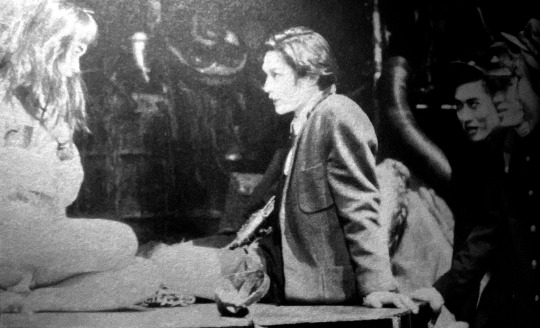
JAIBO: “Length, 250 mm, with a weight of 2.4 kilograms. Arm diameter, 30mm. Cylindrical thrust, 170mm… With pins, plates and rods of die-cast alloy. And hinges of rubber… the rest is pure iron. It is the iron phallus.” - June Vol. 27 In the same interview, Tsunekawa would go on to recall how the members of the Hikari Club were effectively Jaibo’s guinea pigs. In both the play and the manga, an after-school night of the long knives ensues with the slow collapse of the Hikari Club as Jaibo influences the exiling of certain club members, with Zera left ignorant to the social engineering as a mere extension of Jaibo’s elaborate puppeteering. Left embittered by a chess match where he lost to Zera, Tamiya is easily tricked by Jaibo into burning the lychee field as a way to get vengeance. Upon being caught, Tamiya is castrated of his iron phallus, resulting in his exiling from the club as a traitor while also being mockingly likened to a woman in the process. In another scene, it’s recalled that Jaibo and Zera exchange a conversation about the Hikari Club’s loyalty to Zera as they observe the outside world through their periscopes. By all contemporary recollections, Jaibo was the club’s puppet master. He would’ve been the likely source of the club’s ideologies, the underlining hatred to women and fixation on technological violence, replacing mankind with a race of humanoid weapons. Zera would be a shell without his influence. The presence of futurism could arguably even be rounded down to Lychee’s presence in the story. Beyond his theoretic work, Marinetti was also a playwright. He would be most well known for his futurist drama La donna è mobile, a story riddled with similarly perverse renditions of sexual violence. The play notably featured the presence of humanoid automatons a full decade before the term “robot” would be coined by Czechoslovakian author Karel Čapek in the play R.U.R., with the French version of Marinetti’s script referring to the machines as “puppets” for their visual similarity to humans.
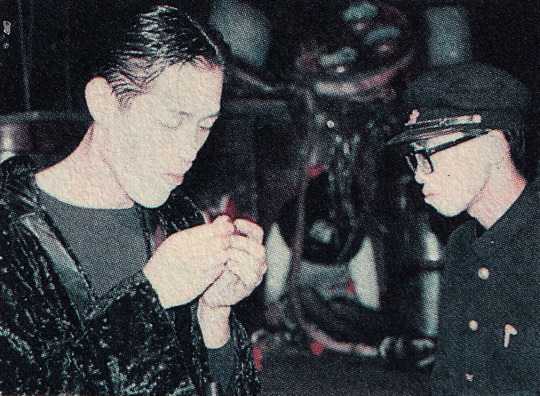
All of this plays out over a soundscape that’s dominated by unnatural electronic frequencies and synthesized percussion. The sound design was arguably one of the most important aspects of Ameya’s plays, with Ameya at one point describing the Tokyo Grand Guignol productions as being an ensemble of his favorite sounds. The setting further compliments the atmosphere, made to resemble the internal of a junkyard or factory warehouse where heaps of technical jump decorate the stage around the monochrome cabinet that would eventually birth Lychee. Some of the featured artists in the play’s first act include Test Department, The Residents, 23 Skidoo and Deutsch Amerikanische Freundschaft. The play’s opening, which depicts the capturing and subsequent torture of a student named Toba through a so-called “baptism of light”, is underscored by the S.P.K. song Culturcide, a grim primordial industrial dirge that paints the image of a dystopia where the genocide of ethnic cultures is likened to the infection of human cells by parasitic pathogens. Instead of being hung with a noose, Toba is suspended by a meathook, left as a decoration amidst the heaps of mechanized excrement. He would eventually be joined by the lifeless bodies of various women the Hikari Club abduct as they’re steadily gathered in a small box at the back of the stage. “Membrane torn apart, scavenging with the nomads. Requiem for the vestiges. Dissected, reproduced. The nucleus is infected with hybrid’s seed. Needles soak up, the weak must destroy. Cells cry out, cells scream out. Culturcide! Culturcide! Culturcide! Culturcide!” - Culturcide (from S.P.K.'s Dekompositiones EP)
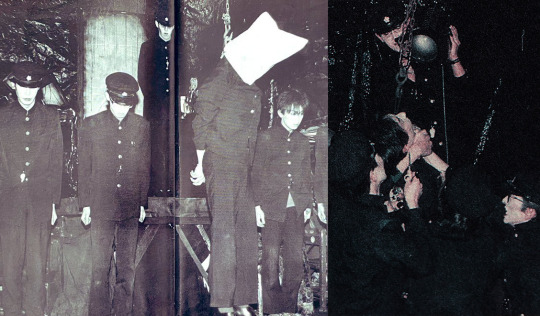
“We are now entering an era which history will come to call ANOTHER DARK AGE. But, in kontrast to the original Dark Age, defined by a lack of information, we suffer from an excess of information, which has been reduced to the repetition of media-generated signs. Through this specialization, it is no longer possible for an individual to attain a total view of society. Edukation is struktured to the performance of a limited number of funktions rather than for kreativity.” “Kommunications systems are designed for the passive entertainment of the konsumer rather than the aktive stimulation of the user’s imagination. Through the spread of the western media, all kultures come to stimulate one another. By the end of the millennium, this biological infektion will have penetrated the heart of the most isolated traditions - a total CULTURCIDE.” “Yet in every era, a small number of visionaries rise above the general malaise. Those who will succeed, will resist the pressure to become kommercialized “images”, demanding identifikation and imitation. They will uphold their principles in the face of impossible odds. By remaining anonymous, they will be free to develop their imagination with maximum diversity. For this is the TWILIGHT OF THE IDOLS, - the end of the proliferation of the ikons and the advent of a new symbolism.” - From the back cover of S.P.K.’s Dekompositiones EP (released under the moniker SepPuKu) Over the course of the play, the story undergoes a drastic tonal shift as the focus moves from the Hikari Club’s hierarchical order and internal conflicts to the relationship between Lychee and Marin. Marin (performed by synthpop musician Miharu Koshi) was the first girl the Hikari Club successfully kidnap through Lychee after implementing the phrase “I am a human” in Lychee’s coding so it can understand the concept of human beauty. This small implementation causes a full unraveling in Lychee’s personality as it quickly forms a close bond with Marin, convinced that it is also a human like Marin. The soundscape changes alongside the overarching atmosphere, going from cold industrial drones and percussive electronica to ambient tracks. Some of the major scenes play out over moving piano-focused pieces and music box tunes from Haruomi Hosono’s soundtrack for Night on the Galactic Railroad. Originally created a weapon like the iron phalluses and the girl capturing device, Lychee is eventually defined in how he transcends from being a weapon to a conscious being with feelings. In this context, the play can be read as a juxtaposition of human emotion against inhuman futurist brutality.
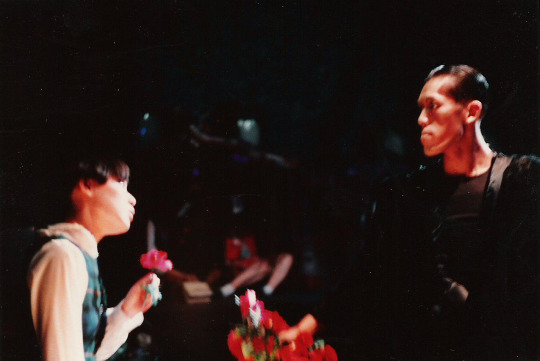
This split was likely the product of the radically different creative ideologies of Norimizu Ameya (the Tokyo Grand Guignol’s founder and lead director) and pseudonymous author K. Tagane (the playwright for the group from Mercuro to Litchi). Ameya had come into the group with radical intentions, holding Artaudesque aspirations to transgress the literary limits of modern theater to achieve something deeply subconscious. Meanwhile, Tagane was a romantic who was known for their poetic and lyrical screenplays. Ameya purportedly sought out Tagane’s screenplays specifically to find a literary base he would “destroy” in his direction, deconstructing the poeticisms in his own unique style. He describes it briefly in an interview regarding the stage directions of Mercuro, stating how he took elaborate descriptions of a lingering moon and ultimately deconstructed them to the moon solely being an illusion set by a screen projector, mapping out the exact dimensions of the projection to being a 3-meter photograph of the moon rather than a “fantastic moon”. It’s believed by some that the Tokyo Grand Guignol’s formation and ultimately short run were the product of a miraculous balance between Ameya and Tagane’s ideologies. It’s possible that Litchi could’ve been a last straw between the two artists. After Litchi, Tagane left the group, with Ameya having to write the troupe’s final screenplay on his own. LYCHEE: “Marin is always sleeping… all she does is sleep. She doesn’t eat anything. Why does Marin sleep all day?” MARIN: “When you’re asleep, all the sadness of the world passes over you.”

"The second half of Litchi was predominantly driven by the sounds of Ryuichi Sakamoto and Haruomi Hosono. During a scene that featured a piece from the Galactic Railroad soundtrack, Miharu Koshi sang to Kyusaku Shimada while dancing like a clockwork doll to the sounds of a twisting music box. The scene lasted for a while and was very romantic, the interactions between Lychee and Marin were all very sweet and cute. The second act of Litchi was all a product of Tagane’s making. By the time of the following play, Walpurgis, I was told by a staff member that Ameya had written the screenplay by himself because Tagane had left.” “… While the first half was filled with repeated mantras and the unfolding aesthetics of an aspiring militia, the second half was immersed in the world of shoujo manga. It did appear that through the intermission, much of the junk and rubble around the podium was sorted out.” “… The Tokyo Grand Guignol’s plays were always defined by a strong nocturnal atmosphere. But in Litchi’s second half, it wasn’t a dark night, but a brightly lit one under the moonlight and plentiful stars in the sky shining through an invisible skylight. Marin doesn’t forgive Lychee immediately for his actions, responding to him harshly in a way that would confuse him and make him sulk. It came across as a somewhat bitter reimagining of a French comedy like Louis Malle’s Zazie dans le Métro or Jean-Pierre Jeunet’s Amélie, it was different that way in how it wasn’t only Maruo’s inferno.” - From a Twitter thread by user Shoru Toji regarding the 1986 rerun of Litchi Hikari Club Some questionable qualities do exist in the relationship between Lychee and Marin. What should be a peaceful retreat from the dystopian corruption still has a sinister undertone in the disparities between Lychee’s cold masculine features in contrast with Marin’s childlike girly innocence. It doesn’t help that Zazie dans le Métro (one of the mentioned films in the recollection) was directed by Louis Malle, who while known for such films as My Dinner With Andre and Black Moon was also responsible for the infamously discomforting Pretty Baby. Then again, Litchi was the product of a confrontational transgressive subculture, so the sinister undertones could be intentional. Keep in mind the contents of Suehiro Maruo’s prolific adaption of Shōjo Tsubaki and how it unflinchingly depicts abuse and manipulation through the eyes of a confused child. It could be possible that Lychee himself was intended to be childlike in its mannerisms. Throughout the existing descriptions, Lychee was shown as speaking in fragmented sentences while struggling to understand basic concepts. Zera was mentioned to also use certain phrases like “cute” when referring to the robot when it was unveiled. And it’s through Marin that Lychee learns morality like a child. The robot’s masculinity could be passed off as the cast all being adults. Hiroyuki Tsunekawa for instance shows distinctly sculpted features from certain angles when performing Zera.
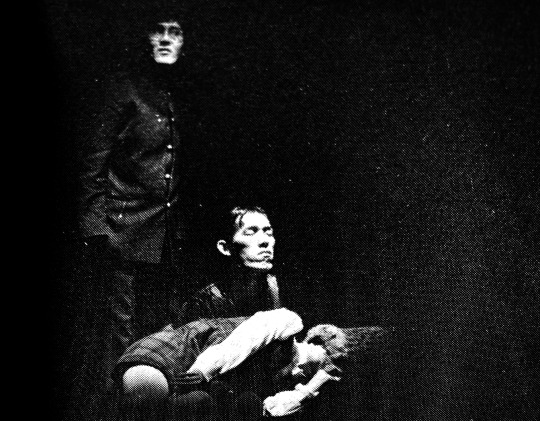
In his aspirations to become a human, Lychee eventually “dies” like a human. With the burning of Zera’s lychee tree, the robot is left with a finite limit on its remaining energy before it totally loses consciousness. After his rampage, Lychee attempts to reunite with Marin, but he runs out of fuel. Before what should be a moment of resolution, things are cut short as the stage goes black, eventually illuminated to show an unpowered Lychee cradling Marin’s corpse in his arms. Zera reemerges to observe the remnants of Lychee and Marin. He speaks of how Lychee will crumble into nothingness alongside Marin for foolishly giving into human emotion, further implying the club’s views on humanity. After this, recollections of the play’s final lines differentiate somewhat. It was said that in the original Christmas performance, Zera calls out to Jaibo, posing the corpses of Lychee and Marin as being his seasonal gifts to Jaibo. Whereas in most popular recollections, it’s described that after his monologue, Zera shouts “Wohlan! Beginnen!” (German for “Now! Begin!”) before prompting the decorations across the stage to collapse, revealing a set of stepladders from behind that the remaining previously deceased club members stand, all drenched in blood with spotlights illuminating their faces from below. ZERA: “And with that, our tale of a foolish romance between woman and machine reaches its conclusion. It ends before me as I stand here, watching. Lychee, the machine, will rust away into dust. And Marin, a young girl, will rot away leaving behind only her bones, which too will crumble…”
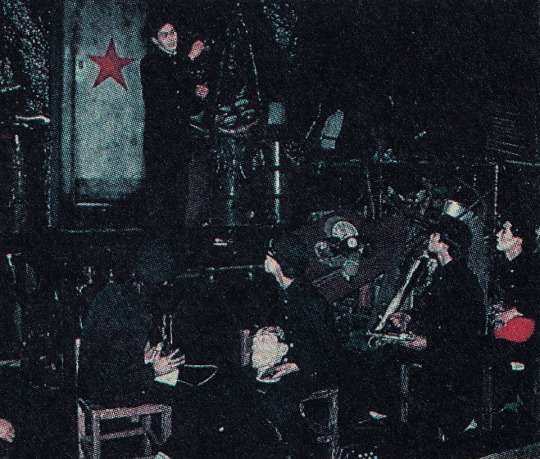
Multiple readings can be deciphered from this conclusion. The most established theory is in relation to the Hikari Club’s aspirations for eternal youth, with the members technically achieving their goal through the stagnation of death. They will remain eternal children since they died as children, unable to ever grow into adulthood. In the context of futurism and mechanized fascism however, it could be read as a bitter observation of a lasting dictatorship. With how the Hikari Club members had rendered themselves less human than their own robot, they survive death to continue their work, seeking to one day eradicate humanity in favor of a race of sentient childlike weapons. “To admire an old picture is to pour our sensibility into a funeral urn instead of casting it forward with violent spurts of creation and action. Do you want to waste the best part of your strength in a useless admiration of the past, from which you will emerge exhausted, diminished, trampled on?” “… For the dying, for invalids and for prisoners it may be all right. It is, perhaps, some sort of balm for their wounds, the admirable past, at a moment when the future is denied them. But we will have none of it, we, the young, strong and living Futurists! Let the good incendiaries with charred fingers come! Here they are! Heap up the fire to the shelves of the libraries! Divert the canals to flood the cellars of the museums! Let the glorious canvases swim ashore! Take the picks and hammers! Undermine the foundation of venerable towns! The oldest among us are not yet thirty years old: we have therefore at least ten years to accomplish our task. When we are forty let younger and stronger men than we throw us in the waste paper basket like useless manuscripts! They will come against us from afar, leaping on the light cadence of their first poems, clutching the air with their predatory fingers and sniffing at the gates of the academies the good scent of our decaying spirits, already promised to the catacombs of the libraries.” - from the 1909 Futurist Manifesto by Filippo Tommaso Marinetti

I forgot what exactly first caused the parallel to cross my mind. I do recall it being reignited when having a closer look over the poster and flyer for Litchi’s Christmas performance in December 1985. The flyer in particular is really a wonderful thing to look at. Predominantly featuring an art spread by Suehiro Maruo, a suited man with Kyusaku Shimada’s likeness is shown caressing a girl in front of a modernist cityscape with spotlights shining up to a night sky. Other suited men in goggles fly in the air with Da Vinci-reminiscent flying apparatuses between the beams of the metropolis’ spotlights. A student in full gakuran uniform flings himself into the scene from the far left side of the image with a dagger in hand, and a larger hand comes from the viewer’s perspective holding a partially peeled lychee fruit. While not based on any direct scene from the play, it perfectly instills the play’s atmosphere with an air of antiquated modernity, like the numerous illustrations of the early 1900s that show aspirational visions of what a futuristic cityscape might resemble. The bizarre neo-Victorian fashions of the future and its post-modernist formalities. The term futurism came to mind somewhat naively from this train of thought. It was a movement I recalled hearing about, but my memory of it was hazy. It wasn’t until I went in for a basic refresher that I felt the figurative lightbulb go off in my head. That was when the pieces started to come together, but then also strain apart from each other into tangents. Granted, many of these parallels could be read as coincidental. Many of them can even be passed off the play being a work of proto-cyberpunk, knowing how Tetsuo: The Iron Man would subsequently explore similar themes of cybernetics and human sexuality. It should still be noted however that in contrast with many of the Japanese cyberpunk films, Litchi was explicit in its connotations between technological inhumanity and fascism, with the machinery itself being the iconography of a dictatorship rather than a product of it. In addition, with Tetsuo the film has strong gay overtones, with the technology being an extension of the sexual tensions between the salaryman and the metal fetishist. For a period of time, efforts were made to make futurism the official aesthetic of fascist Italy, and modern fascism as we know it is in the same family tree of Italian philosophy as futurism. The Hikari Club are explicit in drawing from German aesthetics rather than Italian however, speaking in intermittent German and predominantly using German technology. The spotlight that they used when torturing Toba in the first act, for example, was a Hustadt Leuchten branded spotlight. And if that isn’t a German name I don’t know what is. It was also said that Jaibo’s outfit in the play was modeled after German school uniforms. Though then again, the Tokyo Grand Guignol’s works were a bit of a cultural slurry. Jaibo’s name for example is Spanish (derived from Luis Buñuel’s Los Olvidados), while the character is implied to be German.
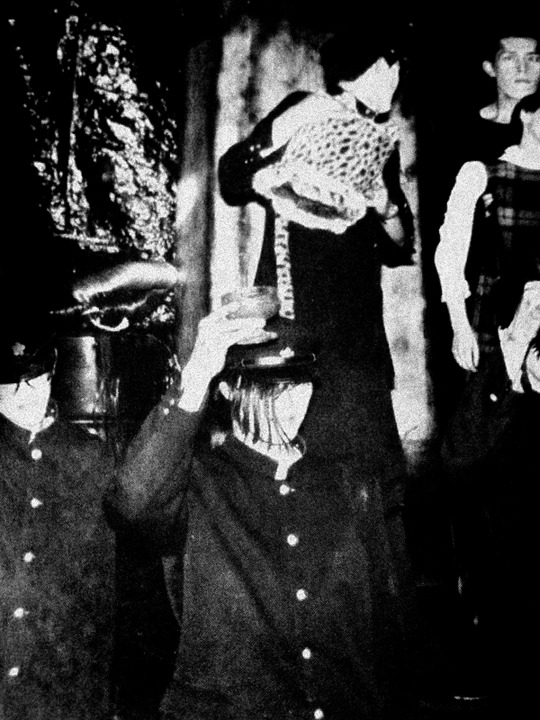
Similar to the cited origins of futurism, Ameya stated in a 2019 tweet regarding the June 9th, 1985 abridged Mercuro performance on Tokumitsu Kazuo’s TV Forum that in the following August of that year, an airplane accident occurred that led to the conception of Litchi’s screenplay. The exact nature of the accident was never specified, but the affiliates he was communicating with all appeared to be familiar with it and expressed concern when it was brought up. This was however one of an assortment of influences that were cited behind Litchi’s production, with the two more established theories regarding the then-contemporary mystique around lychee fruit in Chinese cuisine along with the play being a loose adaption of Kazuo Umezu’s My Name is Shingo. For what it’s worth, the themes of Litchi, along with the Tokyo Grand Guignol’s other works, were closely tied with certain concepts that Ameya personally cultivated throughout his career. A frequent recurring topic Ameya would bring up in relation to his works was the nature of the human body in relation to foreign matter, need it be biological or unnatural. With Mercuro the students taught by Shimada are made into so-called Mercuroids by having their blood supplies replaced with mercurochrome, a substance that is referred to as the “antithesis of blood” by Shimada while in character. In an interview for the book About Artaud?, Ameya cites an interest in Osamu Tezuka’s manga in how certain stories of Tezuka’s paralleled Ameya’s observations of the body. He directly names Dororo and Black Jack, observing how both Hyakkimaru and Black Jack reconstructed their bodies from pieces of other people, going on to bluntly describe Pinoko as a “mass of organs covered in plastic skin”.

A section from June Vol. 27 highlighting some of the more established performers from Litchi's 1985 Christmas performance. The actors from left to right are Norimizu Ameya as Jaibo, Naomi Hagio as the female school teacher (best known in cult circles for her role as Kazuyo in the 1986 horror film Entrails of a Virgin), Suehiro Maruo out of costume and Miharu Koshi as Marin. During his temporary retirement from theater, Ameya would take up performance art, with some of his performances revolving around acts with his own blood. While my memories of these works are a bit hazy, I remember one action he performed that involved a blood transfusion, with the focus being on the experience of having another person’s blood coursing through your veins. While I didn't have much luck relocating this piece (probably from it not being covered in English), I did find on the Japan Foundation’s page for performing arts an interview where Ameya discusses being in a band with Shimada where Ameya had blood drawn from his body while he played drums. He would also describe an art exhibition where he displayed samples of the blood of a person infected with HIV. “After 1990 he left the field of theatre and began to engage himself with visual arts - still proceeding to work on his major topic - the human body - taking up themes like blood transfusion, artificial fertilization, infectious diseases, selective breeding, chemical food, and sex discrimination, creating works as a member of the collaboration unit Technocrat.” - Performing Arts Network Japan (The Japan Foundation) There are still an assortment of open questions I’m left with in regards to the contents of the original Litchi play. One of the most glaring ones is Niko’s eye. In consideration of Ameya’s interest in the body, the detail would fit perfectly with his ideologies. A club member who, to show his absolute loyalty to the Hikari Club, has his own eyeball procedurally gouged out to be made a part of the Lychee robot. Despite this perfect alignment, none of the contemporary recollections mention this element. While Niko does have an eyepatch in certain production photos, it never seems to come up as a plot point. He isn’t the only one to bear an eyepatch either, with Jacob also being shown with an eyepatch in flyers. More questions range from Jaibo’s motives in causing the dissolution of the Hikari Club to the true nature of Zera’s affiliation to Jaibo. While Tsunekawa has stood his ground in the relationship between Zera and Jaibo being totally sexless, in the cited volume of June the editor playfully refers to Jaibo as being Zera’s “best friend” in quotes.
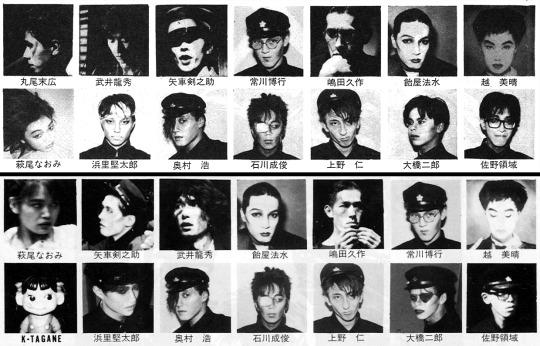
A side-by-side comparison of the cast listings on the back of the flyers for the December 1985 performance of Litchi Hikari Club alongside its 1986 rerun. The 1985 run's lineup is at the top while the 1986 run is at the bottom. Much speculation is naturally involved when looking into the original Litchi Hikari Club since it is in essence a cultural phantom. There’s a reason I used the term genealogy in relation to my research of the Tokyo Grand Guignol’s works. It is an artistic enigma as while its presence lingers in subculture, the original works are now practically unattainable due to the inherent nature of theater. As Ameya himself would acknowledge in another interview, theater is an immediate medium that can only be perceived in its truest form for a very short span of time before eventually disintegrating. So with the Tokyo Grand Guignol’s plays, you are left to scour through the scattered remnants and contemporary recollections alongside the figurative creative descendants of the plays. You analyze the statements of both the original participants and the people they openly dismiss, as even those people were original audience members before reinterpreting the plays to their own unique visions. Despite the apparent differences, I still feel that Furuya’s manga gives a unique perspective to the story when viewed under dissection. That is if you want to see it in strict relation to the play. Outside that, I feel it firmly stands on its own merits. I like the manga no matter what Tsunekawa says, that’s what I’m trying to say. Ameya approved it anyway. It took me a full day to write all this out, and like the first time I went down this train of thought, I’m pooped. During that first excursion, after excitedly spiraling through these potential connections, I noticed in passing mention something about Marinetti’s cooking. You see, later in his life Marinetti aimed to apply futurism not just to art and theater, but cuisine also. As an Italian, Marinetti openly despised pasta, seeing it as being an edible slog that weighs down the spirits of the Italian people. Just further evidence that I would never get along with the man, no matter my liking of the Boccioni sculpture I saw at MOMA all those years ago. Well, outside of him being a fascist and all obviously. I like pasta. Either way, he was on a mission to conceive all-new all-Italian cuisines that would match the vision he had of a new fascist Italy. Nothing could prepare me though for when I saw an image of what would best be described as a towering cock and ball torture meat totem. It is exactly as it sounds, a big phallic tower of cooked meat with a set of gigantic dough-covered balls of chicken flesh on the front and back where you have to stick needles through the thing to hold it together. Words cannot express just how big it is. The thing was damn well near falling apart from how unnatural its shape was, and you’re expected to eat it while it has honey pouring from the tip of the tower. I genuinely winced watching its assembly, I instinctively crossed my legs somewhat when it was pierced by wooden sticks and then cut into sections to reveal the plant-stuffed interiors. As a person with no interest whatsoever in cooking shows, I was on the edge of my seat watching a PBS-funded webisode of someone preparing futurist dishes. Seek it out for yourself, it’s an excessively batshit culinary freakshow. That is more than enough talk about penises for the rest of the week. I’m going to spend the next few days looking at artistic yet selectively vaginal flowers to balance things out, equal opportunity symbology.
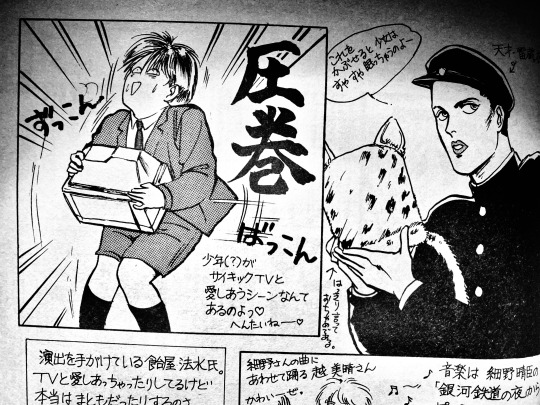
235 notes
·
View notes
Text
Resource: Writing Craft Masterpost
Okay, so one of my favorite things to do when I'm not writing but I want to think about writing is to study the craft. Seriously, I'm a HUGE writing nerd and learning is one of my favorite parts of the process (besides the actual writing lmao). Below is a list of my favorite craft resources that I don't see recommended a ton but which I've found do a great job of identifying and explaining the nitty-gritty rather than just giving blanket advice like 'show don't tell'.
Ellen Brock's Youtube Channel
Ellen Brock, according to her bio, is an editor who has worked both freelance and in the publishing industry. The resource here is on her channel - TONS of free longform videos that break down structure, character arc, anatomy of a scene, dialogue, prose, principles of revision, anything you can imagine.
My favorite video: Character Arc meets Story Structure. An hour long video explaining how character arc and story structure marry within the 3-Act Structure. I made an annotated cheat sheet/study guide just based off this and it literally fixed my WIP lol.
Susan Dennard's Writing Academy - Free Resources
Susan Dennard is a published author who, disclaimer, I have not checked her books out yet (though I've been meaning to!) but I have found her blog post archive invaluable. She writes a ton on writing craft, publishing, revision, etc, and I've coopted a lot of her strategies, particularly in revision, for myself. Highly recommend.
Unfortunately, it looks like my favorite resource (her revision advice) is behind a paywall now (which, fair, she did a LOT of free stuff over the years), but I might put together a frankenstein version of my own revision method one of these days - it's heavily influenced by hers.
ShaelinWrites Youtube Channel
Another writing youtuber who really gets to the nitty-gritty. What I love about them is they are a pantser/discovery writer and they show, both through their advice and success, that you CAN be a discovery writer and not just end up in a mess of unrevised monstrosity, which is what I feel like a lot of people assume. They also do a lot of videos on writing confidence, process, and mindset which have all been very helpful to me.
My favorite video: How to Become a Confident Writer. This video really helped me get back some of my confidence and love for writing when I was struggling. They have similar related videos, and I basically watched ALL of them at various points, but this one really helped me.
LocalScriptMan's Youtube Channel
Okay, here me out. This one is a bit of a departure. I feel like LocalScriptMan kind of takes on this tough love/tough life advice persona, and I don't mind it, but some people might. He's also focused on screenwriting, but a lot of his videos apply to general writing principles, and I feel like, as with the other resources, he really gets to the heart of the craft and breaks down principles in a way I really like.
My favorite video: it's a tie between The Key to Writing Freakishly Good Dialogue and How to Actually Succeed as a Creative. I really liked the latter because I interact a lot with other authors who are querying agents or have one foot in the publishing industry, one foot not quite there (like me), and his attitude toward success changed my mind about how to approach the industry. His advice is something like 'most people keep looking for that big break, but that's very self-focused. If you want to succeed, help others and make yourself a valuable person, not only to get that big break, but because then you can do what you love: creating stories and working on projects, even if they're not your own'. This is a bit more applicable to the screenwriting community, but I do think overall the best part about writing is not just writing, but community, and I think he hits the nail on the head with that one.
Summary: obviously I am not an affiliate (these people 100% do not know who I am lol), but I get frustrated when I'm trying to find answers to my writing problems and all I get are shitty SEO based articles written by the Masterclass website lmao. So over the years I've cultivated my favorites, and wanted to share them. I hope these help anybody who needs them!
#writing#writeblr#creative writing#writing craft#writing resources#writing resource#writing tips#writing advice#original writing#amwriting#writers#writers on tumblr
34 notes
·
View notes
Text
Sugar Rush : November CPNs
What started out as a relatively quiet month after a chaotic October, turned into something else because of a few candies. Especially the whole 11/19 fiasco that surprised us all. LOL. As usual, this is for cpn-loving turtles only. Keep an open mind but still clown responsibly. I can’t believe we only have one month left for this year!
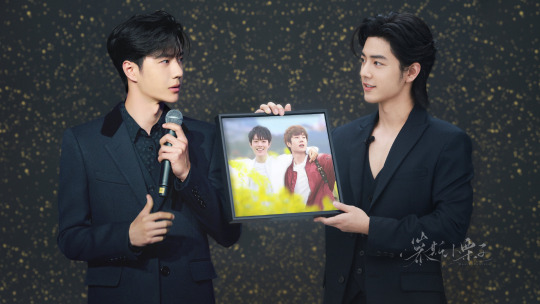
If you wanna recap other years I have archived : 2021 ( one | two ) 2022 ( one | two ) 2023 ( one, july, august, september, october ) 2020 candies and some other sweets before I was doing round up posts may be found on my masterlist.
Let’s review the past month…
• Some side by side / parallel photos of GG ( Tod’s Milan ) and WYB ( Chanel Shenzhen ). They are both photographed with the very beautiful Liu ShiShi. Also the way they are the center of attention. KINGS! 👑
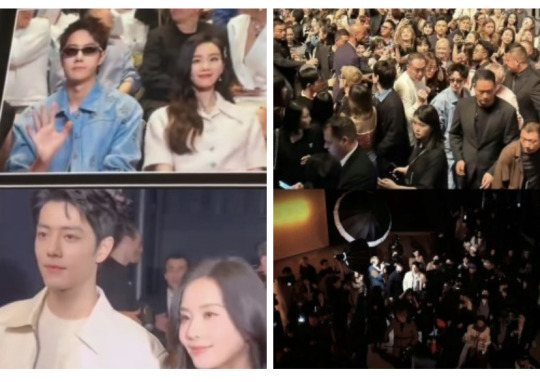
• hoping they play tennis together 🎾 ; there is also a cpn out there about yibo being fully prepared for the game cause he had lacoste shoes and bag then a jacket that he used in wuzhen. people are speculating that XZ bought stuff for him to use cause he is the one who knows more and thought of this brand. this may seem like a stretch but you never know with this fandom when a seemingly insignificant observation becomes a big candy along the way.
• 2021 vs 2023 beach photos similarities + xiamen coincidence and it’s connection to ZZ’s ideal life painting
• LHK ( Liu Haikuan ) giving clues about BJYX? + Part 2 of comments
11/7, GG was announced as Boucheron’s global brand ambassador, then people remembered that one time WYB wore stuff from the brand. So now we have an unintentional couple jewelry incidence😂😂

• the sound of an eagle 🦅
• some similarities in forwarding 119 message, yeah i know celebrities like them are sort of required to bring attention to stuff like this. however, WYB is known to support this cause and even made a VCR specifically for it. if you look at the actual post, theirs is the top 2 in terms of likes and the rest of the celebrities are not the usual ones similar to the boys’ caliber. Another clue that this is WYB’s advocacy of sorts, most, if not all top comments are from his fans. so ZZ joining in on spreading the message seems ( to me and some cpfs ) like influenced by WYB.
Next is they both filmed VCRs for "People in My Heart" - "Classic Characters" series. We just love seeing them support the same projects ^^
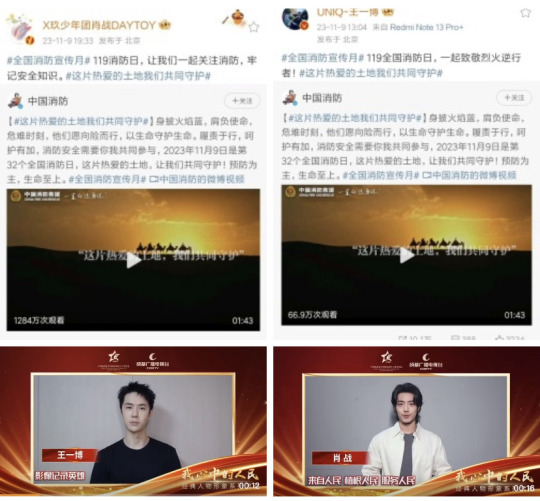
• NARS live drawing
• Candies from WYB’s 11/12 douyin post. Mainly the parallel about the same walls and floor.
• XZ fell asleep on WYB during the golden core scene
• Interpreting YBO’s 11/16 weibo caption
• 11/19/23 double update candies
• similar necklace??? ( cough in vain )
• the full story ( so far ) behind 11/19 📝
• Talking about this a bit late considering when the whole CPN started about this GG mural for GG. There are side by side comparisons of the eyes on the mural and Yibo’s. The CPN being they used WYB’s eyes for that mural.
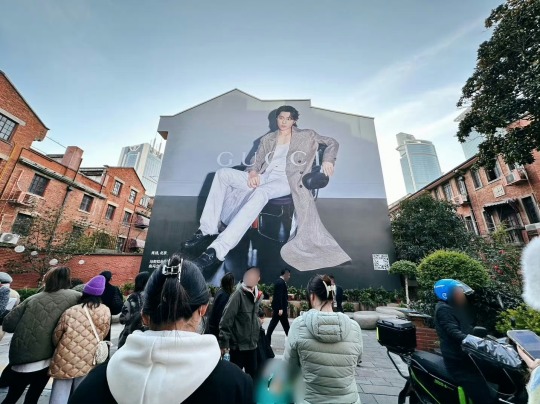
I usually let people have free reign on clowning but this one isn’t for me personally. just because it’s obviously a mural commissioned by GUCCI which a big brand that couldn’t care less about the CP. Maybe it’s a coincidence how similar it is? Because there is a reference photo that should be followed. Also, this is GG’s time to shine. This mural is his & him. I think this is an example for cpfs to learn to separate the boys as individuals, especially for things that are work related and most especially their achievements. While I do believe they influence each other greatly, it’s important to not make every single thing a romantic relation.
• the mystery driver is seen again 👀
• 11/22 Yibo scenery post 🍬
• One night in Beijing Song + 11/23 XZS post
• I don’t really wanna clown with Redmi but the black and white theme from XZS and then the next day it’s Redmi. I was surprised with this cause all the promos were supposed to be related to the scifi themed ad blockbuster!
A coincidence 👀👀👀👀


• small candies form IQIYI scream night 😱
• wyb acknowledging light signs and calls us wangba
• XZ’s 11/27 Airport and Selfie Clues
• there is some talk with BXGs regarding WYB’s redmi appearance, it looks like he was bitten by the mosquito again. lol. I usually just find cpn like this funny cause there is always deniability. also hello to the mosquito who loves to bite the center of his neck.

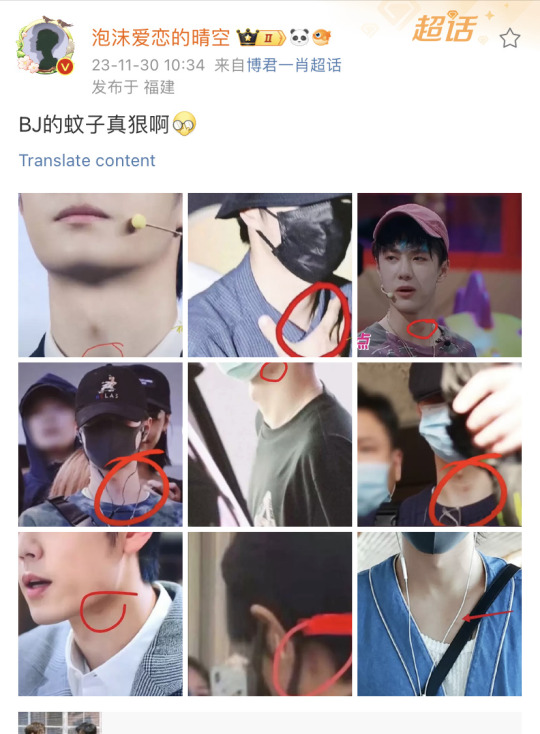
I’m separating these next entries cause it’s not new. I just found myself revisiting bts content and clowning about it. old candy still tastes good! 💯
WYB signs 520 to GG
WYB’s small steps to GG but robe gets caught
Something is funny and XZ has to tell WYB
Flirting and Fighting? “WYB’s love you”
XZ got hurt and WYB said he is gonna kiss it better?
-END.
#yizhan#bjyx#there is no science here i’m just clowning like i always do#sugar rush#i have to say that i was meh with cpns at the start of the month cause how can you top october? lol#but as soon as 11/19 hit i was back LOL
125 notes
·
View notes
Text
❍ ‗ What type of songs Skz would write about you ‗ ❍
Pairings : Stray Kids x reader
Genre/warnings : headcanons, possible use of swear words, mentions of intimacy, mentions of sad feelings and breakups
Summary : What type of songs I think Stray Kids members would write about their relationships
Word count : 1.7k
A/n : these are general headcanons that are described more in a technical way than a fictional one, so yeah
ps: There could be errors. Do NOT repost on other socials. Leave feedback if you feel like it, otherwise enjoy! ♡︎
.・。.・゜✭・.・✫・゜・。.
Chan ‗ ❍
Holy trinity: agsty, fun, horny
Chan seems like the man who would gain inspiration from strong feelings that he may experience.
The man has range and is talented af so of course he'd be able to write anything, BUT
My idea is that he'd be more inclined to write about angsty feelings ranging from sadness, maybe regret. He wouldn't specifically write about you or describe you as a person or your features, those are for him only to appreciate, or in this case, to miss. I think he'd write down his feelings, whether it's plain sadness and longing, or something stronger like regret, or unspoken things.
But he could also be really inspired by the thrill and 'primal' feeling that comes with the start of a relationship, or even a little earlier when it's the 'chasing' moment before getting together. He'd write about how he's absolutely whipped and stupid in love for you, but in the 'fun' way, not in the 'sad' way.
Both the angst and the fun could (and probably would) be mixed with some horniness, absolutely. He could write about how mad you make him and how fucking desperate he is for a taste of you. Again, this could be applied in a more fun and lighthearted song, like a honeymoon phase, or to a darker more 'toxic' context.
Minho ‗ ❍
A delicate story about romance in all its shades
I feel like Minho would keep the lyrics very vague, but still mainly focus on the other person, more than write about this own feelings. While Chan seems more the type to write a 'letter' type of lyrics, I think Minho would be more of a 'storyteller'.
He'd probably write more chill lyrics, never being raunchy or explicit, but could very well imply intimacy in a more subtle way. In a poetic way, if you will.
I do think that he'd give his best with romantic songs, though. He may not look like it at first glance, but Lee Minho is a romantic and you will not change my mind.
I could see him writing lyrics with a lot of artistic/literature/media influence. Which ties back with the whole 'storyteller' thing. They wouldn't be overly complex as in words choice though, they'll need to be simple and delicate with a perfect melody to accompany them. Maybe some technical or production related tricks (like the 'suspense' at the end of limbo)
The same exact style would apply for more angsty or sad songs. I find him similar to Chan in this aspect in the sense that he'd write about sad, depressing and heart wrenching feelings more than angry or vengeful ones. He'd also probably do it in a 'therapeutic' way, like writing down the last chapter of a story that will be finally be closed and locked away in his memories.
He could also write some more 'fun' songs but I think that they wouldn't be necessarily about romantic relationships. But who knows?
Changbin ‗ ❍
About you, about me, about us
Changbin is another master in the craft of composing and writing, which means that he'd be able to switch povs pretty easily in whatever story he wanted to tell, or even change the style of the narration itself.
He could write about any topic he wanted to be honest, and his rapping and freestyling abilities are probably a big help in that sense, but let's focus on romance now.
Bin looks like someone who cherishes a lot his personal life and feelings, which is why it would be harder to find lyrics in which he directly puts himself as the narrator. But it does happen sometimes, and it's usually a cry for help. May be a pleading to someone that left him, an apology to someone he hurt.
Usually though I feel like he's more the one to pick a specific feeling/situation and elaborate on it. Might be a specific argument, the way that a breakup happened, the mistakes that led to said breakup. In this case he would write openly, like he wants the person in question to hear him out through his music.
His lyrics wouldn't be adorned with pretty words or poetic comparisons, but only with real and raw feelings that will pull at your heartstrings for how honest they sound.
Hyunjin ‗ ❍
Straight out of a literature piece
Hyunjin *say it with me*, is a romantic. Yes, that's the key to understanding him, pretty much.
He is a lover, through and through. A lover of art, beauty, emotions, memories, of love itself. This is why I think that any lyrics that he may write will be almost like a dance of words, melodies, instruments, and feelings. He wants to put his feelings down because they overwhelm him.
With each of his songs he seems like he wants to curate every aspect to the T, almost as if he was creating his own little work of art. He wants it to be evocative, to make you feel what he does, and will do it with different tools such as poetical lyrics, a particular choice of instruments, and even the tone of his voice.
Ironically, I think that the more he'd have to 'hide', the more complex and embellished the lyrics would be. He could do a song with quite simple but direct lyrics, and sing it in an energetic way, almost desperate way, like he can't wait to shout out to the person he loves. Almost like a movie/book scene in which the love interest finally confesses their love.
The thing with Hyunjin seems to be that he enjoys writing about angsty feelings. Something that could be a problem of communication within the relationship, or confusion by getting mixed signals from someone, or again with a dangerous attraction for someone who isn't right for him but still manages to 'lull' him into this toxic relationship.
In both cases I think that he'd use a lot of artistic or maybe visually eliciting comparisons in his lyrics, playing with words and the emotions that those elicit in people.
Jisung ‗ ❍
Let it out, angsty boy
I really feel like Han writes when he doesn't find any other way out, so whatever it is it's likely to be explosive.
He's gonna write lyrics that scream how much he's wrapped around your finger, how your love is essentially all he needs to live and that you could do whatever you wanted with him because he's yours. Would be very smart in writing a whole story about it, mentioning mundane things and then ranging to use metaphors and abstract comparisons to let his explosive emotions through.
I feel like he could write out of frustration too, which would bring lyrics with a different tone to them. Whatever he feels must and will be reflected in the song. If the sentiment is cold, sharp and toxic, the producing part of the song will reflect that as much as his own intonation. If it was a cry for help, a prayer almost, you'd be able to feel it through the melody and the whole structure of the song, not only the lyrics.
He's another one who desperately wants and needs for his music to be honest and to elicit the same feelings that he felt while producing it in complete detail, similar to Hyunjin.
Felix ‗ ❍
A lot of feelings and honesty
Felix has range in what he writes, but what I noticed mostly in the projects that he's been part of, is that he uses his voice a lot to set the tone of the song.
Whatever are the lyrics, his extremely adaptable voice with automatically make you understand what he was going for 'emotion' wise. This also applies to the choice of the instrumentals.
I feel like he could be writing about more romantic and wholesome feelings, in this case with lyrics that sound really clean, pure and almost dreamy, but still simple.
But he could also be writing about more gloomy feelings, mainly of sadness and 'mourning', and would probably treat the narrative as something that is already in the past but with which he still has to let go completely. His main goal I think is honesty, which is why the lyrics would be quite simple but hurt where they should.
Seungmin ‗ ❍
Dreamy and emotional
I feel like he's truly someone that could make a listener go 'Oh, so he is in love LOVE' while listening to one of his songs.
The things that would inspire Seungmin the most while writing is the feeling of being in love. He'd probably be quite poetic, dreamy and transfer these vibes to the lyrics and music as well. His voice too, which is adaptable and very expressive.
He's also someone who tries to give a 'narrator' vibe to his songs, almost like he was telling a story that had a beginning and and end. He can write about pretty much anything if it has to do with love. Unrequited love, longing for someone, looking back on your shared happy memories with a hint of sadness. He is also someone who is quite honest and wants the song to represent his feelings in an almost 'dreamy' way.
Jeongin ‗ ❍
Delicate, warm and comforting
Jeongin is someone who seems more comfortable writing about delicate feelings, whether they're positive or negative. A delicate love, almost like a first love, or on the other end a sad ending to that same love.
They lyrics would be quite easy, not overly complex and aim to be as honest as they can in eliciting the same feelings that the writer felt as they thought them out. But there would be a factor of comfort and relatability to them that would pull at your heartstrings.
His voice can also be quite expressive and he knows is, which is why the intonation along with the instrumentals would be fundamental, even more than the words themselves maybe.
He'd like to take a specific feeling and make a song about it, it doesn't necessarily need to be a whole story, moral, or context. He just wants to be able to express his feelings as clearly as possible, without necessarily giving it a background. I feel like those actual moments would be very precious to him and would want to keep them private in his memory.
.・。.・゜✭・.・✫・゜・。.
#skz fluff#skz imagines#stray kids x reader#silentcryracha#my writing#skz#stray kids fluff#stray kids hyunjin#stray kids imagines#skz headcanons#skz scenarios#skz x reader#skz imagine#skz bang chan#skz hyunjin#lee know#seungmin#skz seungmin#skz changbin#skz felix#skz jeongin#skz jisung#stray kids fanfic
214 notes
·
View notes
Note
Hi, Cosmic, I hope your day's been going well. 👋 I'm really into the way that you depict the relationships between Levi and the remaining 104th in This Life, After, so I was wondering, what are your thoughts on Levi and Mikasa's relationship? (in general, I guess, since that's an incredibly vague question).
Hey there!
I actually answered an ask very similar to this not long ago, which you can read here:
But another thing I'll say here is that, while Mikasa started out with a very hostile attitude toward Levi, Levi never felt any such negative emotions toward her, and that's important to understand when talking about their relationship, because I think it says a lot, both about Levi's character and nature, and about Mikasa's eventual growth as a character.
Mikasa hated Levi at first because she saw him as a threat to Eren, and she said some pretty blatantly cruel things to Levi out of that perceived threat. I think the fact Levi never holds that against her is really demonstrative of Levi's own lack of judgement, his great empathy in being able to understand where other people are coming from, and also his selflessness, in how he doesn't really care what anyone thinks of him personally. He's just there to help people in whatever ways he can. If people hate him for that, then so be it. Because Levi never prioritizes himself or his personal well-being or advancement in any way. I think, over the course of the story, Mikasa really learns to be selfless from Levi, and that culminates in her ultimately letting go of her dream to be with Eren when she takes his life. And that in itself is like the ultimate reversal of where Mikasa's relationship with Levi started out, with her feeling very resentful and even hateful toward him, to eventually coming to respect him and trust implicitly in his judgement. Levi really helped Mikasa grow as a person, which I think is true of Levi's relationship with all of the 104th. They all learned important lessons from Levi, in one way or another, or felt a positive impact from him in some way.
So really, Levi's relationship with Mikasa is one of growth and learning. It's one of a young person learning from an adult, and benefiting from an adults presence and influence in her life. Mikasa becomes a better person through her relationship with Levi, specifically by learning from him the importance of being able to let go of the people who mean the most to us, which I think is really a wonderful thing, and demonstrates Levi's own importance in the narrative and his influence on the other characters. I think Levi's lack of judgement toward Mikasa's flaws early on in the story is what really helped push her toward the growth she needed. He could have easily grown to resent her for her attitude toward him, but instead he always understood it was just a human fault, relatable and understandable to all people, and he allowed her to come into her own and learn, instead of scolding her for it. And he does that with everyone, really. Levi in many ways encapsulates one of AoT's core themes, which is the importance of not casting judgements on others without context or an attempt to understand where they're coming from. Again, it's that quality in Levi which eventually allows Mikasa to become the hero she does.
12 notes
·
View notes
Text
Elden Ring and Bloodborne - What do we Learn from the Dead
I have been thinking through a dilemma regarding Elden Ring interpretation. And it occurred to me that Bloodborne addresses and engages with similar concerns.
There is a scene in Bloodborne where the player approaches Lady Maria sitting still and unresponsive in front of a clock face. The player reaches out to touch her and instead she blocks them saying "a corpse should be left well alone". In Elden Ring the player stands in a palace of blood in front of a corpse next to a woman who if she were not wearing a helmet would have a certain amount of resemblance to Lady Maria. This time Leda says "touch the withered arm", inviting you to meddle with a corpse. And I find that an interesting symmetry.
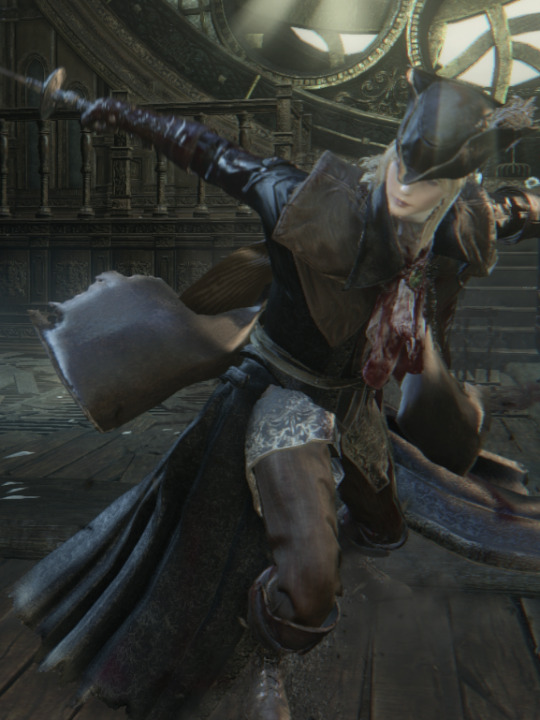
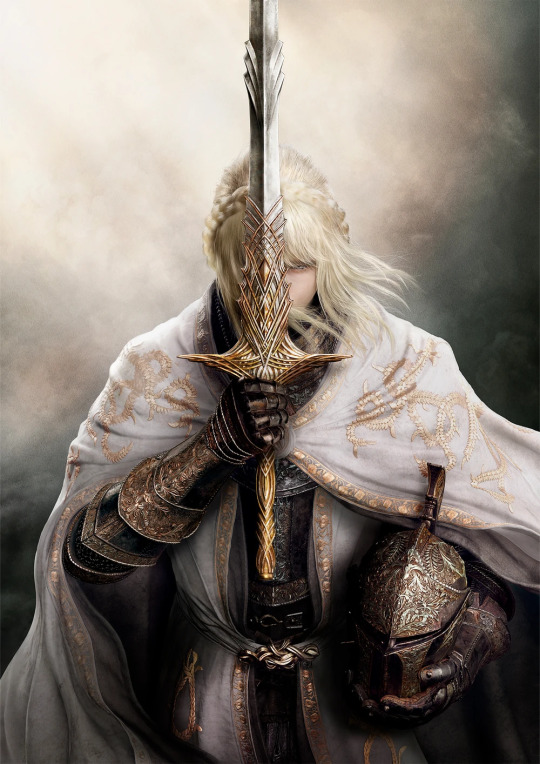
I. Dissection
Two things to note about Bloodborne: 1) Lady Maria's advice to leave corpses alone is implied to come from her experience of finding a corpse and being cursed by the knowledge that came from that incident, 2) It's very late in the game to be receiving this advice considering how many corpses the player has already tampered with. The Chalice Dungeons are for grave-robbing and the different subregions are grouped by tombstones - memorializing corpses. In fact there is a very compelling set of videos by Charred Thermos about the medical metaphor of Bloodborne, including the role of dissection.
I would go a step further and say that Bloodborne weaves together the concepts of both physical and psychological dissection.
In Bloodborne the consumable item to gain material for levelling is called "coldblood", presumably because is much older than the fresh "warm blood" obtained from killing enemies. The highest tier of this is "Great One Coldblood". But "coldblood" can also have the association of murders done pre-meditated and dispassionately "in cold blood".
There is a book called "In Cold Blood" by Truman Capote. I have read "In Cold Blood" for a book report a long time ago and I looked up some reviews to refresh my memory. It's a "whydunnit" story - the killers have already been caught and confessed. The point of the book is to interview them and to try and make sense of the why and how. It is also an example of how difficult it is to give an objective and unbiased account of motive. As this one review puts it (by Eden Gray on Google):
"I would not recommend this book to anyone. Capote claims that this book is non-fiction, however, he has changed so many facts throughout and knew one of the prisoners personally. He also had influence on the end of the book as he did have enough money and influence to prevent or prolong the hanging of the two killers, but he chooses not to as he needed them to hang in order for him to finish and publish his book. His bias comes through clearly with his anti-death beliefs and his favouritism towards Perry is blatant because Capote related to Perry. Capote manipulated his audience to feel sympathetic towards Perry even though he brutally killed the Clutters. His manipulation and deception, verisimilitude to the core, left me thinking what is true and what is false throughout the whole book, further making me disinterested as why read a book that claims to be non-fiction when it is clearly filled with false information."
I think this is the Catch-22 of non-fiction. Digging into the lives of real people is more true to life than simply inventing characters and their psychologies from old stock tropes in fiction. But if you want to tell the non-fiction story of these people then you need to be objective and factual all the way through or else this will strictly limit the ability to work in creative themes or a thesis. But that just becomes boring lists of facts. Especially if you are trying to do a story set in a historical time period with fragmentary primary sources - realism is not possible and there will be a subjective filter on everything.
As Charred Thermos describes it in this video, there is evidence that many characters in Bloodborne are inspired by prominent medical practitioners of the Victorian Era...but Bloodborne doesn't market itself as a true crime story, or even a historical fiction. They are framing themselves as "murdering" the Great Ones - the great people of the past - in cold blood and dissecting their life's work for narrative and thematic components, but they obfuscate this under layers of eldritch aesthetic.
If I had to give an example it's like this: it is known that Alan Moore's "In Hell" is a fictionalized version of the 'Jack the Ripper' murders, because he uses the names and faces of real people (which I know about from this Arcane Workshop video that explores the comic's themes alongside the game Amnesia: A Machine for Pigs). This version propagates the conspiracy theory that a specific Crown physician committed the murders - hearsay speculation that arose 80 years after the man's death when there was no-one left alive to dispute it. Nobody talks about the specific ways that parts of Bloodborne take inspiration from the wild theories surrounding the Jack the Ripper murders. Because the game only takes hints and fragments of names and the theme of committing violence against women by men who may-or-may not have some level of anatomical knowledge. Doesn't rely on the name recognition to tell the story that they want to be telling about the darker sides of humanity in the Victorian Era.
II. Discovery
How should a person feel if they are confronted with the knowledge that the character who they idealized was created from story of a single, specific human being with the identifying name scrubbed off?
The character of Lady Maria toys with this idea - the doll was made in her image, but by what is shown of their personalities they are nothing alike. How did people in the Bloodborne fandom react to this? Seriously, how should this be treated? Is it believed that the doll was made by Gherman to have Lady Maria's looks but none of her personality? Is it believed that Lady Maria has a gentle and pious side when she is not in combat? Does it change your impression of Gherman that he gives you permission to "use the doll" after knowing that this is a simulacrum of a single specific person?
I know real person fiction fans exist, but for the rest of us I feel like it would seem weird and exploitative to learn such knowledge retroactively about a beloved character. On the one hand, if a person wanted to flesh out their fanon they could go read the biography of the original. On the other hand, if new characters are being made as fictional reincarnations of the people of the past then their stories carry all of the baggage from that past. Digging through a minefield of old prejudices and heroic fantasies that aren't compatible with navigating the complex global interdependencies and ethical dilemmas of the present day.
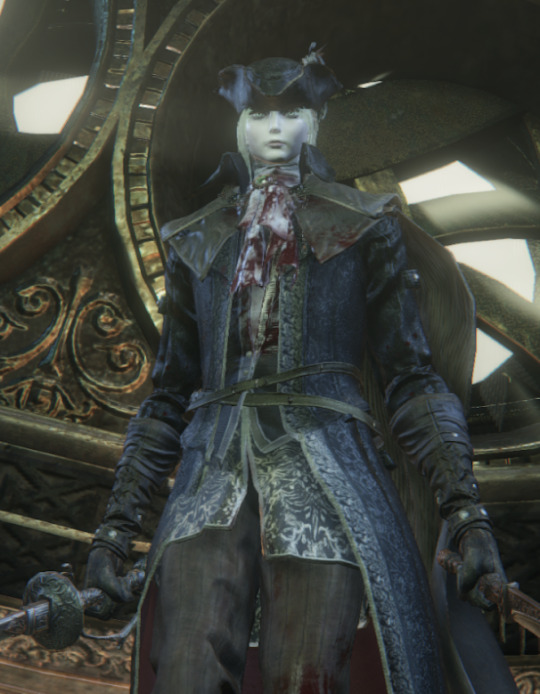
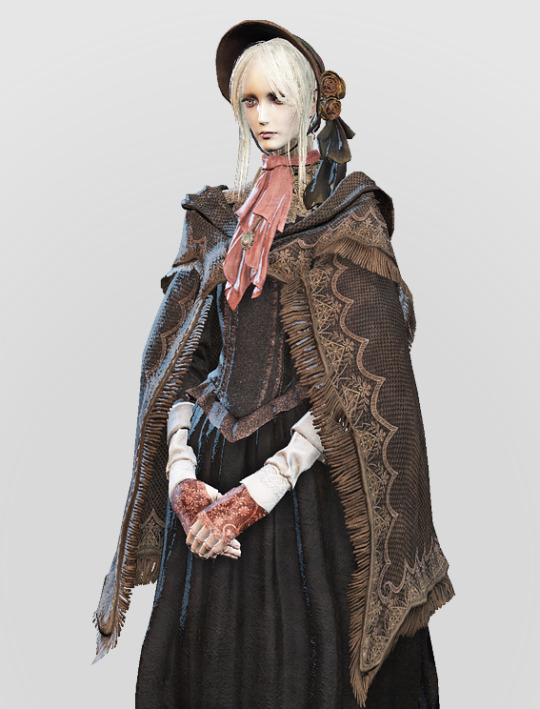
Elden Ring pulls back from the aesthetic of physical dissection and expands massively in the realm of psychological dissection. As I've said before, it's a "whydunnit" story - the stuff about becoming an Elden Lord is a red herring (perhaps even a "red HAIRing" looking at Radagon and Radahn for example). The purpose of the Tarnished is to understand why Marika shattered the Elden Ring. To understand and accept her decision as part of the process of mourning. This dissection is not done for the benefit of the dead but is for the living to learn from the mistakes of the past and do better in the future.
Marika-as-Leda invites you to the dissection of the corpse in the cocoon. This is a secret past that they were trying to leave well alone. It is generally dark and unpleasant and surreal because these are the inner fears and obsessions of a mind that struggles to tell the difference between fact and fiction. Stuck in the nightmares of a superstitious past. Recreating cycles of painful and nonsensical rituals supporting a mythology of individual exceptionalism born out of a fear of trusting that people can work together. Messmer "the Impaler" having connotations of being a vampire because an egotistical person in a leadership role is incapable of self-reflection (vampires traditionally cannot see their reflections in mirror of polished silver), and may conclude that their solution is always best despite evidence to the contrary until suddenly everything is on fire.
In Elden Ring and the Shadowlands you can find references to the real and mythological people who served as inspiration for Marika. She's Marie Antoinette. Anne Bonny. Bloody Mary. Anna, sister of Arthur Pendragon (mother of Mordred). Mary Shelley. Marina "La Malinche". Virgin Mary, Mother of Christ. She's all of them and none of them and probably a few more that I've missed. Some of these may even have been the inspiration for Bloodborne's Lady Maria herself due to the way FromSoftware tells stories across a multiverse. But above all she is Lady Maria OF the Astral Clocktower. If you can understand the Clocktower and the FromSoftware meta-narrative, then you can understand Lady Maria far beyond what is available by the item descriptions alone. At least, now with the context of Elden Ring it's possible to understand it. Don't know if it could have been done back in 2015.
A lot of people were not ready for the revelations of Elden Ring: Shadow of the Erdtree. Not sure they'd be pleased to learn that there is a way to demystify the method below the madness of Bloodborne.
III. A Confession
So, it wasn't random chance that I connected the concept of "coldblood" to Capote's "In Cold Blood". Sometimes I do a "this day in history search" for each the dates that FromSoftware releases games and sometimes this yields interesting results. September 30 was the release date of Dark Souls 2 DLC: The Crown of the Ivory King. September 30 was also the birthday of Truman Capote. This isn't the first time an author birthday has popped up in a way that I find meaningful. Regarding themes of Elden Ring and Armored Core 6, respectively, there was John Wyndham - author of the Midwich Cuckoo, The Day of the Triffids, and the Chrysalids - on July 10, release day of Armored Core (1997). And Walter Michael Miller Jr. - author of "A Canticle for Leibowitz" - on January 23, 1923 which matches the release day of a game called "Thousand Land" (2003).
And September 30 wasn't a date that I selected randomly to scrutinize next. More than ever before the Shadowland area of Elden Ring gives me the impression of a rotting old theatre where literally "the curtains have fallen" on previous eras. There's a progressive rock band for that: Dream Theatre. Combing through Dream Theatre's discography not only are there several motifs that I can see echoed in Elden Ring, but several album release dates line up with FromSoftware's previous games including "Chaos in Motion", the live video album that was released September 30, 2007 - same calendar date as the Crown of the Ivory King DLC in 2014. This is an interesting alignment because in classic writing by Virgil the Gate of Ivory is the one through which false dreams pass through.
What I'm taking away from is this: FromSoftware will not "show their work" and explain in interviews or supplementary footnotes the full scope of media and real life influences on their games. Because boasting about all of the research they did would be morally wrong - a false dream. They are in the business of making fictional characters, not exploiting the dead and putting words in their mouths for sensational name recognition. They may take inspiration from scientific concepts such as medical and psychology but they won't pretend to be an authority on these things. If the player wants to fully comprehend the story then, yes, grasping at the hints of references to real world phenomena and doing your own research into those topics is a way to get there with greater accuracy.
IV. Witnesses
And how can a person know if they are correct about identifying any given influence? You can't "know", but you can build a case for it. Like how the broad strokes of complexity theory are described in this video about the 5 layers of depth in 2016 game The Witness. When understanding the logic of the game universe you want to be collecting "Witnesses" of what the narrative does and does not support. I like this idea of calling witnesses as an extension of the dissection/murder mystery metaphor - after all murder trials make use of both eye-witnesses and expert witnesses.
If I can collect 25 items containing a helix or spiral pattern and sort them according to number of twists and this vaguely follows the agreed upon timeline of history from other sources, then that tells me that the game history supports being sorted into discrete units of time and this is reflected in the art direction. If 5 of those 25 give unexpected results, then either I didn't understand the rules of the helices as well as I thought, or there is a misinformation in the commonly believed timeline. If I can collect 20 instances of suspiciously meaningfully anagrams, then that's 20 Witnesses that the game supports anagram wordplay in certain situations. If I can look to the band "Rush" and collect 7 album release date matches in FromSoft's back catalogue + 13 sets of visuals or wording similarities to specific songs then that also would seem to be 20 Witnesses that these are intentional references rather than the random noise of the universe. Maybe there is grounds to think that FromSoftware saw something inspirational in the creative or intellectual philosophy of that specific group of musicians - drawing from contemporary sources rather than solely on an outdated catalogue of classical poetry.
Based on collecting Witnesses, there is evidence that Elden Ring contains an elaborate reference to JoJo's Bizarre Adventure, which is itself well known for making global musical pop culture references. In Bloodborne the Great Ones convey their messages through sound.
V. Verdict
Altogether I'm feeling more confident about the relevance of the 3 additional backlogged posts that I've been working on that delve into the musical scavenger hunt of Elden Ring. But the dilemma was about whether it is right to clinically dissect and present evidence that a video game has made characters out of sensitive topics as they relate to the personal histories of specific people who are living or have living family. I guess it depends on presentation - is due respect given to the topic? Are there cases where it would be better to recommend an auto-biography or other primary source than to paraphrase? Is there something of value to be learned, or is it all just entertainment?
#Elden Ring#Bloodborne#media analysis#fromsoftware meta narrative#Having thoughts and opinions about how stories and histories are written again#I think the “In Cold Blood” presentation was the one that I started off with a musical clip#“my criminal mind/is all I've ever known/they tried to reform me/but I'm made of cold stone”#“my criminal mind/is all I've ever had/ask one who's known me/if I'm really so bad/(I am)”#Do people know Gowan? I guess he's a Canadian so maybe not so much
11 notes
·
View notes
Text
An Afterword: talking about Welsh and Shedar

While we are done with the movie and the show, it cannot be understated, just how much we still have to cover. Both in terms of canon, and things out of the realm of canon.
And this includes interviews, and things that never got made.


[source]
The thing that often bothers me, is that the creator of the franchise that my most favorite cartoon of all time is a part of, probably despises said cartoon.
I can't not think about that, when I see Simone and other Aux Tresors characters reused in Wakfu season 4 as background character assets, or when I think about how every show except Aux Tresors has had an OST released, or how the only Aux Tresors companion in Waven is Lou. Though I know, logically speaking, that it's more likely because it's just not very popular.
youtube
Funnily enough, I personally, and rather selfishly, think that Welsh & Shedar's demise is probably the greatest fortune to happen to this franchise. What was one of the worst things to ever happen to Tot was one of my greatest fortunes. (I would not care about Joris as a character, had Kerubim never existed. The cartoon, and their relationship, mean a lot to me, for personal reasons.)
To Tot, the thing that I love the very most has cannibalized one of his life's dreams. Starting with the resources, and ending with character designs themselves. Even the character design of a fucking cat??
As an artist myself, I can't even begin to imagine the horror of that, and yet... I feel nothing but joy. It's quite weird, how life works.

The good news is that Welsh and Shedar has been resurrected by Ankama (watch as it gets a full artbook and an OST release before Aux Tresors, an 11 year show that still doesn't have those, yes I am bitter), so, it is mostly water under the bridge. We will hopefully get to enjoy both, in a couple of years.

[source]
But I feel like it's very likely, that a lot of Aux Tresors and the way Tot may feel about it, was influenced by this disaster, and I couldn't begin this post without addressing that.
So, what was, or could be in the future, Welsh and Shedar?
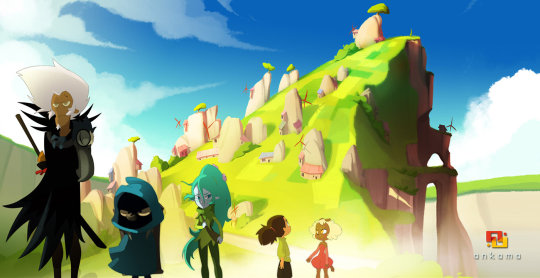
A plot summary from the youtube trailer's description, just as filled with Tot's overwhelming sadness as everything else relating to W&S's cancellation, man, goes as follows: "Here is the trailer for an animated series project launched in 2012 which has very little chance of arriving on your screens. The story is that of Welsh, a young boy forced to fight for an inheritance he never knew existed: that of the throne of the Kingdom of Bonta. Ankama’s “animation” department has plenty of ideas behind its graphics tablets: series, special episodes, films, our brains are always buzzing! However, not all projects are lucky enough to reach you…"
So basically, it was/is/will be a story about a young man, or boy, who finds out he is the next in line for Bonta's throne, and is taken there by Joris. How all of this happens is rather murky, AKA:

Anyway,

Tot has reported that his idea for this series was quite similar to the anime "Ranking of Kings", which I had sadly not watched. Make of that what you will.
When does Welsh & Shedar take place?

Firstly, I will say that, because of how much Tot loves this series, for years it was in a state of vague canonicity. AKA "it did likely happen, but it has never been produced so we don't know WHAT it is, that happened there. There sure was a guy named Welsh at some point."
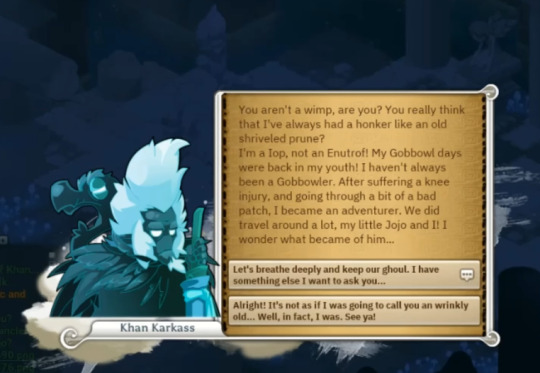
What points to this is 1. Khan's old man design still being canon,

And 2. This usage of Welsh & Shedar-era Joris in an official timeline. It says that Joris would have been 60 years old, in this series.
Obviously, this timeline is subject to change, if/when Welsh & Shedar becomes real, and there are a lot of things we don't know!
Some curiosities...
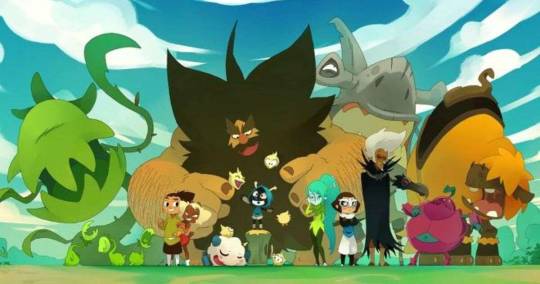
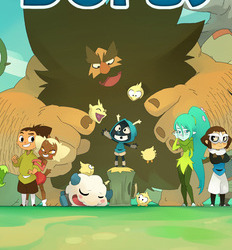
Funnily enough, there exists this image, which was leaked by a French site when Aux Tresors began airing, — mistakenly used as promo for the series.
It could be depicting some other draft of W&S where Joris is a kid. Or, it could be depicting something between Aux Tresors and W&S, from when Ankama had to make something new up to take W&S's place.
It yet again makes me yearn for an Aux Tresors art book. Because seriously. What does this even mean.
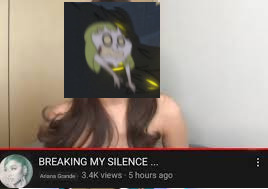
Anyway thank you france for killing W&S, making Aux Tresors (the PEAK.... the SLAY.....) real, and now resurrecting W&S. We truly do live in the kindest timeline 🙏
43 notes
·
View notes
Text
[MK1] Bi-Han & Kuai Liang. Good brother? Evil brother? Nah, just different reactions to trauma, part 4
part 1, part 2, part 3
Sources provided a clear difference how brothers felt about their father. For Kuai Liang, the man was a cherished parent AND authority figure he built his life around. For Bi-Han, father (and mimicking him grieving Scorpion) was a source of frustration and limitation he did not agree with. Bi-Han and Tomas definitely had a more complex relationship with their father than Kuai Liang did.
So far, we got only little bits in regard to mother and her influences on brothers and Lin Kuei politics but enough to see how Sub-Zero and Scorpion’s relationship with her differ from how they felt about father.
Before I will dwell on those relationships I would like to point out a small detail noticed during my research: so far there is no direct mention that the mother was in fact a wife of Grandmaster. She is either referred to as a mother or parent - which makes sense, because her importance is related to the brothers, not to their father, so it would be weird if Bi-Han, Tomas or Kuai Liang talked about her as the “wife of Grandmaster”. At the same time, the lack of implication of marriage bond between mother and father[1] and how she is refered feels similar to the obscure reference from original timeline:
Born in America, Sub-Zero was the oldest of three children, which included a brother and sister. Their mother wanted a normal life for her sons, who had already been chosen by the Lin Kuei to become warriors for the clan. She tried in vein to hide them from their father whose own life in America was only a cover for his true identity and purpose. Eventually they were found and their father returned with them to his homeland. Their mother and sister were never seen or heard from again. (x)
Due to this, I decided to not describe her as the wife or supposed wife of Grandmaster and stick just to provided by sources terms of mother, parent and Lin Kuei fighter - so in advance sorry for repetition of those words. At the same time, this specific way of including the mother in Bi-Han, Tomas and Kuai Liang’s story creates a possibility of a more complicated family relationship, both between brothers and their parents or between the mother and father alone. And as a result the whole Lin Kuei inner politics, as we already have a hint of its complexity due to Cyrax and Sektor's loyalty to Sub-Zero threatening Kuai Liang’s birthright to the title of Grandmaster. Keeping it in mind, here are some of my thoughts and conclusions about the mother and her sons.
Let’s start with Kuai Liang. There is no doubt he respected and deeply cared for father’s teaching. As I hopefully proved in the previous part, there is a solid reason to think that the loss of a cherished parent affected Scorpion to the point that grief influenced his behavior (mimicking father) and in result, relationship with brothers (barely talking with them if it didn’t involve father or tradition up to Sub-Zero’s betrayal). He expressed a burning anger at Bi-Han for letting their father die.
Kuai Liang doesn’t seem to have the same emotional bond with mother.
Sindel: Both your parents were excellent fighters. Scorpion: I can only hope to live up to their example.
Like yes, he will acknowledge Sindel’s opinion and hope to be good as his parents but that is like the only one time we hear him saying anything about mother - and even then, she is mentioned alongside the cherished father.
Mind you, this is solely my impression, but this intro reminds me of film scenes in which a character is told by others about a parent they had never had the chance to meet or know too well. It may be a wrong impression, but there is something about Kuai Liang’s response that makes me wonder how old he was when mother died and if he lost a parent at a young age, did it fuel his deep dedication to father as there was no other authority figure to influence him as a person?
Granted, both Kuai Liang and Bi-Han never bring mother first in their intro dialogues - what A) says a lot about their upbringing and B) differs from some mentions of father. But in Scorpion’s intro there is hardly anything truly personal about his bond with mother, or her personal feelings on Lin Kuei duty, especially when compared to those focused on the previous Grandmaster.
In contrast, we have interaction between Tomas and Bi-Han:
Smoke: If Mother were alive -- Sub-Zero: She would applaud my actions.
Tomas and Bi-Han may have a different idea of how mother would react to their brotherly conflict, but both talk about her in a more personal way. Tomas invokes her the same way he brings father into discussion:
story mode: "Were he here, Father would advise us to wait without protest."
or
Sub-Zero: You were never truly one of us. Smoke: Were Father here, he would disagree.
So we can assume mother had an impact on Tomas as he respected her as an authority figure similar to father. Alternatively, he thinks Bi-Han is more likely to listen about mother than anything he will say about their father.
The letter part would be an interesting parallel between Tomas and Bi-Han, because Smoke himself is implied to grow up without a father or not being close to his biological parent - when talking about his original family Smoke directly mentioned so far only mother and his twin sister.
Also, the same as happened with father in intro dialogues, Kuai Liang and Tomas do not talk about their Lin Kuei mother. Scorpion claimed that Tomas never mention his biological mother and sister:
Scorpion: You never speak of your mother and sister. Smoke: Their ghosts no longer haunt me, Kuai Liang.
but as the other intro dialogues proved, Tomas does talk about them directly and indirectly with some characters,
like Kitana,
Smoke: My sister was my twin. Kitana: How it must have hurt to lose her.
Tanya (priestess warrior)
Smoke: After losing my family, I lost my faith. Tanya: It's the only thing that can sustain you, Tomas.
and Liu Kang (Fire Lord who may be responsible for their death)
Liu Kang: I cannot bring back your family, Tomas. Smoke: You can't or you won't?
Like I said before, it is impossible to tell for sure about which mother, biological or adoptive, Smoke was speaking, but as he claimed Li Mei resemble him mother
Li Mei: I remind you of your mother? Smoke: No-nonsense and tough as nails, just like her.
I personally assume he meant the adoptive one, as according to Smoke’s ending he lived with the Lin Kuei family for around 15 years. Logically thinking he would have more clear memories of her than about the biological parent he lost in childhood. We of course have no idea when - and how - his Lin Kuei mother died, but if I’m right in my assumption, then Tomas is providing vital insight into what kind of person she was. As Tomas said, a tough and no-nonsense woman and that fits perfectly the image of an excellent Lin Kuei fighter, because frankly, Bi-Han and Kuai Liang easily fit that description too. As presumably, the majority of Lin Kuei warriors.
Another thing to note, the adoptive mother is not identified by Tomas with kindness, comfort or warmth or anything most people usually associate mothers with. This of course does not mean his adoptive mother didn’t love him or was a bad parent but may give us an idea what it felt to grow up in a clan primarily focused on training warriors. A purpose that definitely affected how people interacted with each other and what was expected from children.
However the most interesting thing about Tomas considering Li Mei to be similar to adoptive mother is the fact that from all possible female fighters, he identifies mother with a woman forced into and shaped by Umgadi system of servitude but who found her true purpose outside said system.
Kitana: Resuming your old role is a waste of material. Li Mei: Being First Constable is my first, best destiny.
or
Liu Kang: I hear the Umgadi want you back. Li Mei: I prefer to remain First Constable.
And this finally led me to the eldest brother and Sub-Zero’s statement that mother “would applaud me”.
Bi-Han outright claims mother would be proud of him and logically thinking, supportive of his choices. Which is a drastic contrast to how he perceives father as he did call the man a fool that doomed Lin Kuei.
And here comes an important thing: though sources barely provide us an idea who Bi-Han’s mother was in original timeline - a Lin Kuei herself who knew what lay ahead of her sons already chosen by the clan or just a woman that was unlucky to meet and have three children with an assassin working undercover in America - she was literally the only person that tried to give Bi-Han and Kuai Liang a normal, safe life. This woman, whoever she was, challenged a powerful assassin clan to save her two sons and daughter and was presumably killed alongside the daughter by Bi-Han’s father. This definitely affected Bi-Han’s worldview and interestingly, the sources have never implied Sub-Zero had any strong emotional ties with his father.
Mythologies Sub-Zero’s backstory mentions only Bi-Han and Kuai Liang being kidnapped against mother’s will, that cryomancy was passed down to Bi-Han from father, that he took his place and mantle when the man died and that is basically all we know about their relationship.
Between brothers, it is always Kuai Liang to mention other male members of their family with respect, as can be seen with new timeline Scorpion and alternative timeline Kuai Liang:
Sub-Zero: I disown you in every way. Noob Saibot: Then disown my name, 'Sub-Zero'. Sub-Zero: The name was Grandfather's first.
and
Sub-Zero: Grandfather? Sub-Zero: Defeat me to earn my mantle. Sub-Zero: You honor me with your kombat.
despite the possibility that said Grandfather may be the one that kidnapped brothers to enroll them into the Lin Kuei clan, while Bi-Han as a Noob Saibot was the one bringing their mother, even if just to be sarcastic/ironic:
Noob Saibot: You disappoint me. Sub-Zero: The feeling is mutual, brother. Noob Saibot: Mother would be so proud.
and on two separate occasions talked to Jacqui about her mom that passed shortly before MK11’s events:
Noob Saibot: Vera's soul calls you. Jacqui: Keep mama's name out your mouth, Revenant! Noob Saibot: Revenant? I am Wraith!
and
Noob Saibot: Return to your mother's arms. Jacqui: She's dead, asshole. Noob Saibot: And her soul is mine.
and isn’t it a surprisingly similar thing to current timeline Bi-Han talking to Kitana and Mileena about their dead mother?
And yes, Liu Kang’s timeline is a fresh start and a lot of things have changed but some elements seem to repeat themselves, whether the Keeper of Time agrees with it or not. Which is why I think mother - and her fate - again deeply influenced Bi-Han, the same as he was influenced in the original timeline by her desperate attempt to save him and Kuai Liang from Lin Kuei bondage.
Bi-Han claimed mother would applaud his action, so she may herself feel resentment for Grandmaster’s idea of tradition and duty to Earthrealm and that resentment was passed down to her eldest son. Alternatively, it was her death that made Sub-Zero question both the nature of the relationship between Lin Kuei and Fire Lord and his father’s wisdom.
This leads me to another detail that may not be intentional on NRS’s part but it is repeated through the sources. The same as mother is never said to be the wife of Grandmaster - what admittedly is the most logical assumption for a traditional (patriarchal) clan as a way to secure the line of legal heir from proper marriage - the decision of adopting Tomas was made solely by Grandmaster. And so we have:
Smoke’s bio: As a boy, Smoke lived to hunt with his family. Their final hunt, however, ended in tragedy. Having accidentally trespassed onto Lin Kuei lands, they were attacked. Smoke was orphaned. Ashamed by his warriors' actions, the Lin Kuei's Grandmaster adopted Smoke. He raised him alongside his sons, Sub-Zero and Scorpion.
and
Kitana: You are Kuai Liang's adopted brother? Smoke: His father's honor demanded that he take me in.
and
Reptile: Lucky for you, Kuai Liang's father took you in. Smoke: It didn't feel that way at the time.
or
Bi-Han, story mode: Mind your place, Tomas. Father may have taken you in, made you one of us… but your blood will never be Lin Kuei.
As I talked before about Bi-Han and Tomas forced brotherhood on different occasion it struck me how the adoption resolved mainly around father’s selfish reasons like saving his honor and erasing the feeling of guilt rather the boy’s safety and emotional health. There is something truly disturbing about forcing a child to be part of clan that murdered his family over a trivial matter. But there is also something disturbing about how the mother had no say in the adoption of Tomas, as there isn’t any hint the man consulted that with her. Now, it is understandable that in a very traditional (patriarchy) clan the father, as the Grandmaster and head of his family, could make decisions without consultation with others, including his own wife or children. But usually people who love or at least mutually respect each other discuss the vital matters before making decisions whose consequences will have such a great impact on their and their children’s life. Adopting a child, so greatly traumatized and from totally foreign culture, is something that should be a joint decision of father and mother if both were supposed to raise said kid alongside their own. In that regard the father comes off badly, not only by how sources made his reasoning selfish (“his honor demanded”, “Ashamed by his warriors' actions”, “father wanted us to be brothers”) but also how uncaring he was toward the mother of his children, especially compared to Sindel and Jerrord.
We have no idea if Bi-Han’s father and mother were in love or were forced into a relationship by demands of tradition, maybe even through arranged marriage. But we have Sindel that though married Jerrord as a means to ensure peace,
Sindel's Bio: When Sindel ascended to Outworld's throne, she worried that she was ill-prepared. Adding to her stress: her impending arranged marriage to Jerrod, an Outworld noble. Forced into it to placate a rebellious region, Sindel could only pray that he was worthy. To Sindel’s delight, Jerrod proved an ideal partner.
she was loved, respected and supported by her husband and the feeling was mutual.
So far there is little suggesting Bi-Han’s mother had any real influence over Lin Kuei’s politics or that Grandmaster sought out her advice. She is not called the wife of Grandmaster, a title suggesting some high social position and so far only Sindel's remark gives us any idea what her role in clan could be. Liu Kang and Scorpion do not bring her dedication to Earthrealm and duty as a counterargument to Bi-Han’s resentment the way they talk about previous Grandmaster’s teaching and wisdom. She is pretty much removed from the picture and only Sindel and Tomas bothered to mention her at all. Sindel by praising Kuai Liang’s both parents as excellent fighters and Tomas by recalling her authority - the only one that Bi-Han seems to agree with, as according to him reclaiming Lin Kuei independence is what would please his mother.
If Tomas and Bi-Han have such a different idea of mother, the first question coming to mind is which brother speaks truth and which one is delusional. However I think that is not right question, because mother could not to speak about her desire to gain independence for Lin Kuei with Tomas - not because she didn’t love or accept the boy as her own, but because the orphan, as not born into clan, could not understand fully the Lin Kuei situation. Especially not when little Tomas was mourning the killed family and not when it became clear he and adoptive father became close.
Another thing worth to examine is the possibility that Bi-Han, consciously or not, also associates Li Mei with his mother, as
he clearly respect her, a former Umgadi turned into First Constable, more than Tanya, the current leader of priestess warriors:
Sub-Zero: No one in your order can defeat a Lin Kuei. Tanya: A nescient boast which is easily disproven.
or
Sub-Zero: Mileena sends a bodyguard, not a warrior? Tanya: Underestimate me at your peril, Sub-Zero.
vs
Sub-Zero: I hear your skills are formidable. Li Mei: As are those of all who have been Umgadi.
he encourages Li Mei to stop serve Royal Family and govern themselves
Sub-Zero: Your constables could also govern. Li Mei: We are sworn only to protect and serve.
something he usually does not do, as Sub-Zero has no interest in people outside Lin Kuei.
I’m painfully aware there is not enough source material to have clear conclusions and many of my thoughts are based on guesswork and comparative analysis. That said, I do think that as death of father deeply influenced Kuai Liang, the same happened with Bi-Han when their mother presumably was killed on duty. We have no idea what is the age gap between brothers, however I do think that Kuai Liang, as the younger brother, could not have a chance to know their mother well so all his devotion was focused on the living parent that raised him. If the mother personally wished for or actively supported Lin Kuei independence, she could do so as a way to ensure her children will have a better life than endless servitude, the same way the original timeline incarnation tried to save her sons from servitude to the assassin clan. In that case, Bi-Han was raised with an additional influence that shaped his mindset about his duty to clan above duty to Liu Kang and Earthrealm. If mother’s death was somehow the fault of Grandmaster and/or Fire Lord, as in, they sent her on ill-fated mission, it could be the origin of Bi-Han’s resentment against both men.
There is much more to say about the conflict between tradition vs independence and I for sure will talk about that soon, but the next part will be focused on POWER.
SIDENOTES:
[1] Alternative timeline seems the closest to presenting Bi-Han and Kuai Liang’s parents as the “normal family” as both look devastated when their children were kidnapped by Lin Kuei.
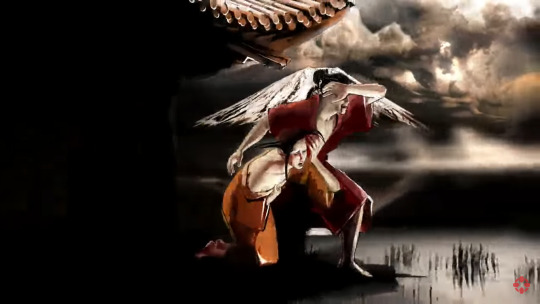
At the same time, MK11’s intro dialogues of Sub-Zero and Noob suggests their grandfather was once a Sub-Zero himself, with raises a question how much their parents were aware of danger from the assassin clan and if any of them were a Lin Kuei themselves.
#mortal kombat#bi han#sub zero#smoke#kuai liang#scorpion#tomas vrbada#li mei#bi han and kuai liang's mother#deserves so much better#the weirdest conclusion so far is how tomas provides more insight into kuai liang and bi han's mom than kuai liang alone#and how intros use smoke to compare female characters sidetracked by narrative (lin kuei mother and harumi) to women from game#also i don't wanna see bi han tomas and kuai liang's father as an abusive and/or despotic parent#but the sources doesn't paint him much in good light when there is jarrod to compare#i did not talk about the possibility that mom could be cryomancer herself and have this special bond with bi han due to shared ice powers#because there is barely anything how ice powers works in this timeline ;/
38 notes
·
View notes
Text
I wholeheartedly believe that this entire story was actually a fabricated lie.


I'm sure I'm not the only thinks this too! Personally, I think there is a far deeper story to Hidgens and the workin' boys that he's keeping to himself, and that perhaps his actions in the short film were actually a reflection of the actual story hidden in his past. Him wielding the axe and gun, as well as him killing the workin' girls, are in fact reflections of actions commited against the original workin' boys. I think Hidgens killed them, but he didn't do it on purpose, it was an accident which does add some truth to his story about the lightning.. that the death of the workin' boys wasn't planned. My theory is that a Lord in Black was behind it, mostly due to the appearance of the workin' boys ghosts.

As other people have pointed out, they're shrouded in blue lighting and share a similar appearance to Max Jagerman, who was also a ghost due to forces related to the Lords in Black. The boys ghosts could just be hallucinations conjoured up by Hidgens to justify his later actions, but just as much as that could be the case they could also be visions conjoured up by a Lord in Black, either Pokey or Blinky, in my opinion. Pokey due to the blue-theming and, of course, Hidgens love for musical theatre which he similarly shares, or Blinky due to his previously seen ability to turn people on each other and encourage violent tendencies, like what was done to Bill and Alice in Watcher World. Pokey could have utilised Hidgens passion for musical theare and equal desire for fame to manipulate him, promising just that and eventually turning him on his own six boyfriends as a price, leaving them dead and leaving him alone with none of what he sought after. Equally so, Blinky, loverboy that he is, could have gotten envious of Hidgens workin' boys harem and turned Hidgens on them, leaving him with nobody. Quite similar situations for both Lords really, they might even have shared custody of him.. ragging some insane old man back and forth between themselves, you know? Either way, Hidgens was influenced to kill the workin' boys, and the subsequent realisation of what he'd done was what sent him down a spiral of isolation and instability. Or his lightning story is actual true, in that case RIP and terrible luck on his end.
20 notes
·
View notes